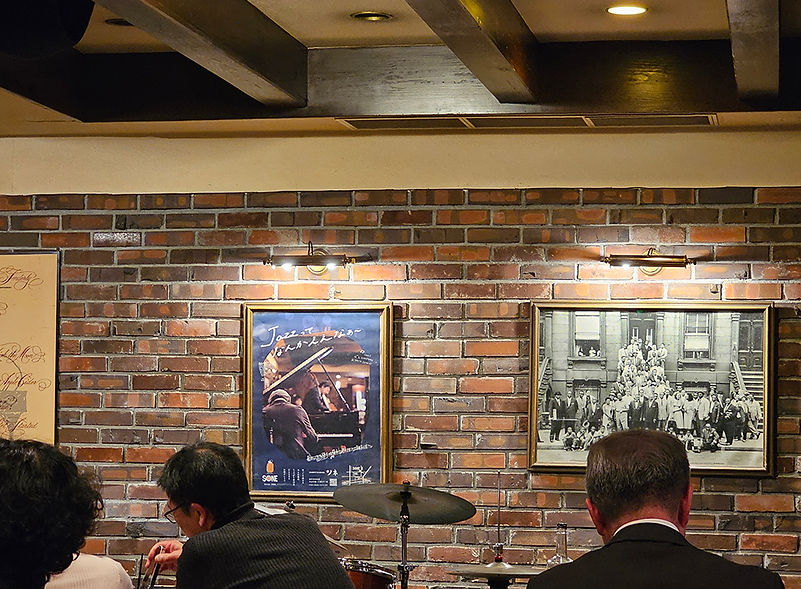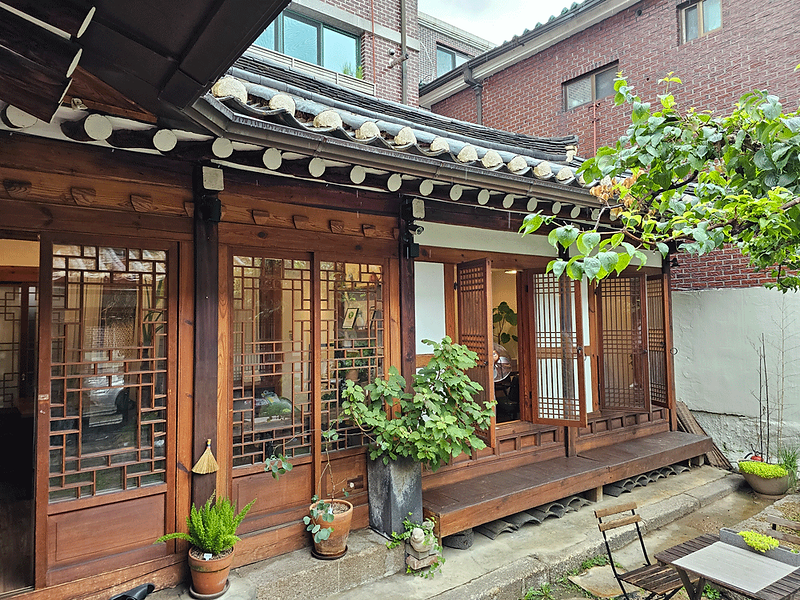


Kim Mina/高瀬美菜
半農半ライター
1982年九州生まれ、関西育ち。北海道大学教育学部卒。2006年、地域情報紙の編集記者1年目に初の海外旅行で韓国・釜山へ。2010年〜韓国語を学び始め、2012〜13年ソウルの延世大学語学堂に留学。帰国後、再び編集記者を経て2015年秋からフリーランス。食・農・芸術・韓国を通して人を描く「半農半ライター」の活動を始める。
2017年、韓国での農業体験取材を機に国際結婚し、韓国へ移住。現在は半農半作家生活を模索しつつ、子育て・家業・日本語会話講師の仕事に励み、今しか書けない思いをエッセイや詩で表現することがライフワーク。

2.10.2026
DAYS / Kim MIna Column
オンマと呼ばれる日々
村上春樹、神戸、タイムトラベル

2026年1月、1年半ぶりに日本へ帰省した。これまではインフルエンザの流行期に気管支が弱い息子を連れ歩くのが怖くて、夏に帰るようにしていたのだが、彼も小学生になり、たいぶ体が丈夫になってきた。そこで韓国生活9年目にして初めて、冬の日本へ飛び立った。
「これからしばらく韓国に行けないかもしれないし、会ってゆっくり話したいから、私が近くまで行ってもいいですか?」
私の帰省を知ってそう言ってくれたのは、韓国移住後に仕事を通じて知り合い、仲良くなった韓国人の友達だった。彼女は数年前、パートナーの仕事の都合で日本に移住。その後は近況報告のメッセージを送り合ったり、年1~2回彼女が韓国に帰省中、会えそうな時はお茶したりしてきた。
彼女の家から私の実家がある兵庫県までは、電車や新幹線を乗り継いで数時間。せっかく関西まで来てくれるのに、世界遺産の姫路城だけ見て帰るのはもったいないなと思っていたら、後日連絡が届いた。
「三ノ宮のホテルを予約しました。村上春樹が好きで、前から一度神戸に行ってみたいと思ってたんです」。
小説『ノルウェイの森』以外、彼の作品を読んだり読まなかったりしてきた私には、神戸と聞いて村上春樹を連想する頭がなかったが、そうか!ファンにとっては神戸といえばハルキ、ハルキといえば神戸だ。若き日に兵庫県の阪神間で暮らしていた村上春樹の作品には、時々神戸の街が登場する。
韓国で30~50代の本好き、日本文化が好きな人と話していると、みんな私よりはるかに村上春樹の作品を読んでいる。彼女もまさにその一人だ。それに私たちは、何かと苦しかったコロナ禍の子育て中、わずかな合間をぬっておしゃべりし、本の話を通して親しくなった仲だった。「村上春樹の神戸ね!そういうことなら」と私ははりきり、姫路城と神戸を満喫できる1泊2日のプランをたて、私も半日ずつお供することにした。

白く美しい姫路城を足早に見学し、約40分電車に揺られていざ神戸へ。韓国移住前、大阪まで通勤するために乗っていた電車に彼女と並んで座り、きらめく瀬戸内の海と淡路島を眺めながらおしゃべりしていると、とても不思議な気持ちになった。最近のことから私たちが出会うもっと前のことまで、思いつくままに話していたからかもしれない。福岡や東京、大阪や北海道、韓国、台湾、カナダ、オーストラリア、バリと話の舞台があちこち移り、過去や現在を行ったり来たりしながら三ノ宮に到着した。
夕食をしに訪れたのは、村上春樹のファン “ハルキスト”の聖地のひとつであるイタリアンレストラン。この店は、村上春樹が若き日に何度かガールフレンドと訪れた場所で、毎年ノーベル文学賞の発表日にファンたちが集う場所としても知られている。
この店で出されるピザには、1962年の創業時から数えて何枚目に焼いたものかを示すシリアルナンバーが添えられている。私たちのピザはNo.1,468,570。村上春樹の紀行『辺境・近境』には、1997年にこの店を訪れた時に頼んだピザがNo.958,816だったと書かれているので、29年の間に50万枚以上のピザが焼かれてきた、というわけだ。

次に訪れたのは、ジャズの生演奏が楽しめる老舗レストラン。私の中では昔から、ハルキといえばジャズなのだが、それは彼が小説家になる前、ジャズバーを経営していたからだ。神戸じゃなくて東京でだけど。まあそんな細かいことは置いといて、日本ジャズ発祥の地と言われる神戸で、ワイン片手にしっぽりと生演奏を楽しもうではないか。
その夜、目の前に大学教授に連れられてきたと思われる学生たちが座っていたからか、私たちは自然にお互いの大学時代についてぽつぽつと語り始めた。私は広島や北海道で、彼女はソウルで過ごし、二人とも「いつか小説が書けたら」と思っていた。その頃読んだ村上春樹の小説『ノルウェイの森』は、韓国では『喪失の時代』というタイトルで翻訳出版されていたらしい。
ピアノ、ドラム、コントラバス、そしてボーカルの歌声は、私たちを一気に忘れかけていた過去へと連れ戻していった。「10代の頃はずっとコントラバスを弾いていて、音楽家になりたかったんだ」と彼女に話したのは、この時が初めてだったかもしれない。札幌の大学でジャズ研究会に入りかけた話も。しばらくして、彼女が私の鼻にそっと手首をかざして言った。「匂いわかる?この香水の名前、ジャズクラブっていうの」。私たちは目を合わせ、噴き出しそうになるのを堪えて笑った。

神戸は夜景が美しい街だ。せっかくなので三ノ宮からゆっくり西側へ歩き、ライトアップされた居留地や中華街を見学しながら、赤く光る神戸のシンボル、ポートタワーがある海辺まで向かった。メリケンパークのカフェでひといきついた後、対岸のハーバーランドへ行くと、平日の夜だからか人がおらず、神戸の夜景を一人占め状態だった。
1995年の阪神淡路大震災から2年後。高校1年生の頃、初めて電車に乗って遊びにきて以来、何度も訪れ、何度も目にしてきた神戸のこの風景。そこに今、彼女がいて、一緒に旅をしていることが本当に不思議でならなかった。人生とは予測不可能なことの連続だ。7年ほど前、韓国で出会った時には、こんな日が来るなんて想像もしていなかったのだから。

翌日は昼から合流し、中華を食べ、神戸市立博物館で開催中の大ゴッホ展へ行く前にイタリアンバールでカフェラテを飲むことにした。テラスに座ると、彼女がおもむろに包みを取り出した。開けると中には万年筆と手紙が入っていた。
「お誕生日おめでとう。私、最近書くことが楽しくて。だから、万年筆はどうかなと思って」
誕生日が2か月違いで同じ年の私たちは、この旅の途中からため口で話すようになった。仕事を通じて知り合ったということもあったし、私がため口で話すと関西弁になるので彼女が聞き取れないかも、という心配もあり、これまでお互い敬語を使っていたのだが、それをやめることにしたのだ。
神戸の街角のカフェに座り、ため口で語り合っていると、学生時代の友達に再会しているような錯覚に陥った。でもそれは、私だけじゃなかったようだ。
「なんか若い頃の美菜ちゃんに会ったような気がするし、若い頃の私にも会ったような気がするし。なんだか時間旅行をしたような気分だね」
三ノ宮で別れた後、しばらくして届いたハングルのメッセージに「時間旅行」と書かれていて、「ああ、それそれ」と頷いた私。そう、私たちは2日間、村上春樹ゆかりの地を巡りながらタイムトラベルをしていたのだ。そのおかげで、彼女についてもっと深く知ることができたし、心がぐっと近づけた気がする。
韓国で暮らす私と、日本で暮らす彼女。次はいつ、どこで会えるだろうか。2026年1月、冬の神戸で一緒にタイムトラベルした思い出を胸に、それぞれの場所で挑戦を続け、また笑顔で再会できますように!

12.10.2025
DAYS / Kim MIna Column
オンマと呼ばれる日々
「家」と「仕事」のはざまで

この秋、時間と技術を要する仕事が舞い込んだ。技術の方はなんとかするとして、問題は「時間をどう確保するか」だった。
7歳児を子育て中のわが家には、助けてくれる「ばあや」や「じいや」はおらず、「ちょっとお願いします」と預けられる先もない。だから、私が忙しくなると、おのずと夫と息子に負荷がかかっていく。
たとえば、私が取材で夜遅くなる日は、21時過ぎに夫の仕事が終わるまで、息子は職場で待つ。午前中に原稿を書かないといけない時は、夫が洗濯をし、昼食の準備をする。息子を寝かしつけた後、22時前から深夜まで原稿を書く時は、翌朝の息子の世話は率先して夫がやる、という風に。
そんな毎日は、思いのほかうまくいっているように見えていたが、私の仕事が大詰めを迎え、3時間も寝られなかった朝。息子のぐずりをきっかけに、夫婦ともども何かがぷつっと切れてしまい、大喧嘩になりかけた。
それまで機嫌よくサポートしてくれていた夫の残念な姿を前にし、私はひどく落胆した。「今が山場なのに…あともうちょっとの辛抱なのに…」と。だけど、疲れすぎていて涙も出ない。泣いたところで目の前にはやるべき仕事が残っているし、息子を学校に送らないといけないし、午後からは夫の仕事を手伝いにいかなきゃならないのだ。
ピリピリとした空気はそのまま三日三晩続いた。仕事で感じるストレスよりも、唯一の頼りである家族から受けるストレスの方がダメージが大きくて、一気に白髪が増えた(気がした)。
今回私は小説を書いていたわけではなく、取材した内容を元にずっと文書を書いたり、書き直したりしていたのだが、その最中に何度も何度も思い浮かんだのは、イギリスの小説家、ヴァージニア・ウルフが残したこの言葉だった。
「女性が小説を書こうと思うなら、お金と自分ひとりの部屋を持たねばならない」
ほんまそれな!結局100年前と何にも変わってないやんか~!そうひとりごちながら、パソコンの前でキーボードを打ち続けた日々が終わると、外はもう紅葉が散り始めていた。

仕事がひと段落したら、今度は義実家の一大行事が待っていた。山の中にあった夫の祖父母のお墓を義両親のリンゴ畑の一角に移動させる、というものだ。この行事のために、普段は会うことのない義父の兄妹やその子どもたちが一堂に集うことになった。
でもその週末は東京で、K-BOOKフェスティバルという韓国にまつわる本のお祭りが予定されていた。そこには毎年、韓日翻訳者や出版関係者、日韓の作家などたくさんの人たちが集まる。
「息子も1年生になったことだし、キムジャン(越冬用のキムチを家族総出で作る行事)さえ重ならなければ行けるかも…」と淡い期待を抱いていたのだが、見事にお墓移動の日と重なった。日程を告げる義父からの一声で、東京行きの夢は儚く消えた。
いや、別に「絶対来なさい」と強制されたわけじゃないので、「ちょっと東京で仕事があって…」と嘘をついても良かったのだけれど、今年は翻訳の締め切りを理由に旧正月の家族旅行をキャンセルし、息子の手足口病がうつって秋夕の家族旅行をキャンセルし、原稿の締め切りを理由に法事もキャンセルしてしまっていた。
それに、今回私が行かないと、義母と義弟の奥さん(次男の嫁)が食事作りや片付けで苦労するのは目に見えている。なのでもう四の五の言わず、おとなしく義実家に向かったのだった。

梨の木があった場所に新しく移されたお墓には、義祖母が1908年生まれ、義祖父は1909年生まれ、と書いてあった。お墓の前で、足が震えている96歳の義父の姉を支えながら、私は今年お参りに行けなかった大阪の祖父母と、ずっとお参りに行けていない熊本の祖父母のことを想った。そして、日韓の祖父母たちが生きてきた時代に想いを馳せた。
義祖父母の墓には12人分の遺骨を納めることができ、どうやら私もここに入ることになるらしい。でも、どんなにこの家に尽くしたとしても、義母や次男の嫁、そして長男の嫁である私は、夫の祖父の子孫たちの名前が刻まれた石碑に名前が載ることはない。
個人的には昔から、自分の骨など海にまいてくれたらいい、と思っていたし、「国」や「家」や「出身地」に対する愛着や執着がもともと少ない人間なので、石碑だとか家系図だとか、血のつながりを表すものに自分の名を残してほしいとも全然思わないのだけれど。
だが、韓国の女性たちの中には、こういう家父長制や家族のあり方に嫌悪感を示して非婚を宣言したり、自分のキャリアを中断したくない、経済的にも仕事は辞められないという理由で、結婚しても子どもを持たない選択をしたりする人がいる(もちろん事情は人それぞれ違うので、一概には言えないが)。
そういう生き方を選んだ人たちが書いたエッセイや小説が注目され、日本でも翻訳出版されている。いつの時代も、新しい生き方をしている女性たちが社会の先頭に立って積極的に発言したり、次々と仕事をこなしているのだ。
そんな様子を見て「女性が声をあげやすい世の中になってきて良かった」と思う一方で、いつも少しばかりのもどかしさと、切なさも感じてしまうのはなぜだろう。
それはたぶん私が、祖母や母、義母たちが女性として生まれて味わってきた苦労を見聞きしてきた人間で、自分自身もその苦労の半分くらいを経験してきてしまったからだと思う。
母世代のように生きたかったわけじゃないのに、気づけば同じようになりかけて、最初の結婚生活は自分から立ち去ったし、二度目の今もまだ、仕事や締め切りを理由に義実家の集まりに行かないと、どこか後ろめたさを感じてしまう始末だ。
だから今は、新しい生き方を選択した人たちの話よりも、大変な過去を生き抜いてきた女性たちの話をたくさん知りたいし、今の自分のように「母」「嫁」「妻」などの社会的役割と自分の仕事の間で、もどかしさを抱えながら生きている人たちの話を読みたい、と強く思う。
自分が選んだ場所で誰かをケアしながらも、表現することや自分らしく生きることを諦めなかった人、今まさに模索しながら生きている人たちの物語を。
そういう本をどんどん翻訳してみたいし、いつか自分もそんな物語を書いてみたい。残された人生で私にそれをやりきる力があるのなら。どうかそんなチャンスをください。神様、仏様、ご先祖さま。
新しいお墓の前でそう祈った秋の夜。この1年、何度も励まされてきたある翻訳家の言葉を思い出した。
「学校で勉強してすぐ翻訳の仕事を始めるよりも、就職してまったく違う分野の仕事を経験したり、子育てしたり、人と別れたり…いろんな経験があればあるほどいいです、翻訳は。あとですべて回収されますから」
同じ韓国で、2人の子どもを育てながら翻訳してきた方がそうおっしゃるのだから。私が今日まで味わってきたすべての経験は、いつか必ず翻訳や文章を書くことに生かされ、良い形で世の中に還元していけるはず。いや、絶対そうするんだ!薄暗いリビングでパン、パンッと洗濯物のシワを伸ばしながら、静かな決意を胸に刻み込んだ。

墓移動の2週間後、私は再び義両親の家に行く。今度は大量のキムチを漬けるために。
ゴルフの予定があるという義弟のスケジュールに合わせ、3週間後になりかけたけれど、あいにくその日は年に一度、私が長年推している歌手がコンサートを開く日だった。「3週間後だと予定があるので来られません!」と笑顔で宣言すると、キムジャンは2週間後に決行されることになった。
日本から海を渡ってきてもうすぐ9年。最初は何もわからず遠慮がちだった「嫁」も、推しのコンサートへ行くためにキムジャンの日程を譲らないという、当たり前の自己主張ができるようになった、というわけだ。「嫁の立場でこんなことを言ったらだめかも」と勝手に思い込んでいたのは私の方で、ちゃんと理由があれば、義父も義母も親戚も、ただただそれを受け入れてくれる。それがよくわかった1年だった。
韓国のハラボジ(おじいさん)、ハルモニ(おばあさん)が眠るお墓に私も一緒に入るのか、海やら山に散るのか。それはまだわからないけれど、あと何十年かはこの世でいろんな経験を積み、それを翻訳や文章に生かしながら生きていきたい。そして来年こそは、絶対に東京へ行くぞー!

ここまで読んでくださったみなさん、今年も一年ありがとうございました。このエッセイを通して出会えた方々に、いつも感謝しています。毎日いろいろなことがありますが、今日までたどりつけたことにまずは乾杯!みなさん、どうかどうか、良いお年を。
9.10.2025
DAYS / Kim MIna Column
オンマと呼ばれる日々
自分という雲を突き抜けた夏

noteに「韓国の本屋をめぐる旅」という独立系書店の訪問記を書き始めて8か月が経った。そして、2023年4月に配信を始めたポッドキャスト「韓国に住んだらこうなった」は、この夏100回目を迎えた。
こうして自分が楽しいと思うことや、今の環境でもできることを探しマイペースに続けていると、少しずつ同じ興味・関心を持つ人たちに出会えるようになってきた。
この夏はおもいがけず、日本で書店やひとり出版社を営む方たちから連絡をいただき、ソウルの書店やパジュの出版都市を一緒に訪ねる機会に恵まれた。他にも、となり街の書店でスタッフのみなさんと一緒にランチを持ちよって語り合ったり、大好きな作家さんたちのブックトークを聞く機会を得たり。「嬉しい」を通り越して「生きててよかった!」と感じる、そんな熱い時を過ごした。
「日本語でたくさん話したい」
「大好きな本を通じて人と出会っていきたい」
そんな切実な思いから始めた本屋めぐりやポッドキャストが、自分だけでなく、まわりの人を良い意味で巻き込んでいく…。そういうものに変わりつつあることを感じたこの夏。韓国生活8年目にしてやっと、失われた時を取り戻せたような、トンネルから抜け出しておもいきり息が吸えるようになったような、そんな気がしている。

私が韓国の書店を訪れる時は、いつも場所と営業時間を確認し、書店のインスタグラムやホームページがあればさっと見るくらいで、あまり調べ過ぎずに行く。たまたま書店の前を通りがかったお客さんの目線で、純粋に本のある空間を楽しんでみたいからだ。
また、本を購入する時に店員さんに話しかけはするが、仕事の邪魔をしない程度に短く、と決めている。取材なら根掘り葉掘り聞くところだが、私はあくまでも「お客さん」だから(ただし、ゆっくり話せそうな状況ならいろいろ質問することもある)。本はできるだけ一冊以上買う。ブックカフェなら本は買わず、コーヒーだけ飲むこともある。店内写真を撮る時は必ず許可をとっている。
だけど、日本で書店を営む方たちはやはり、ただの「お客さん」ではいられない。書店の立地や広さ、どんな本棚を使っているか、そこには何冊くらい本が置けるのか?どんな本をどんな風に並べているのか?イベントや読書会の頻度など、書店を運営する人ならではの視点でぐるっと見渡し、観察したり、分析したり。目を輝かせながら店主さんやスタッフの方に質問してみたり。
言葉の壁はあるといえども、同じ仕事をしている人同士、通じるものがたくさんあるのだろう。韓国の書店の方たちは、日本からやって来た書店の店主さんたちを歓迎し、飲み物をサービスしてくださったり、たくさん質問に答えてくださったりした。
「東京に行ったら、ぜひ寄らせていただきますね」
「はい、ぜひ!お待ちしています」
そんなやりとりを間に立って通訳していた私は、日本と韓国のあたたかな交わりを目の当たりにし、「この場に立ち合えて本当に良かったなあ。生きていてよかった!」と、また思ったのだった。

「最初は自分から始まったんです。自分のことばかり見つめ、考えていた。でも絵を描き続けるうちに、まわりのことをよく見て描いていきたいと思うようになりました」
先日参加したブックトークでそう語っていたのは、もうすぐ活動10周年を迎える30代のイラストレーターで、絵本も出版している作家さんだった。その言葉を聞いた時、私ははっとした。ここ数か月なんとなく感じていたことを作家さんが言語化してくれたからだ。
私も今、自分ではなく、まわりに視点が移りつつある。そのせいだろうか?自分の内側にあるものをどう表現すればよいか考えていた時よりも、今の方がやりたいことや人に伝えたいことが明確になり、楽しさや幸せを感じることが増えてきたなあ、と思っていたところだったのだ。
自分の内側ばかり見つめていた時は、とても苦しかった。
20歳の頃から「畑を耕しつつ、本を書いて暮らしていきたい」と夢見ていた私は、20代前半にいくつか小説を書いたものの、自分の作品のつまらなさにげんなりし、「もっと広い世界、人を知らなければ」という思いから、名刺一枚でたくさんの人に出会える編集記者の職を選んだ。
やむを得ず書くこと以外の仕事をしていた時期も、「いつか必ずこの経験を自分の文章に、作品に生かすんだ」と思ってやってきた。どこにいても、何をしていても、私にとっては毎日が取材だった。
だけど、そうやっていくら取材するように生きても、人に伝えたいことを言葉や何らかの形で表現しなければ、一生誰にも伝わらない。
さらに、私は気心知れた人たちにも、長年自分の夢について正直に語ってはこなかった。「才能があれば、もう作家として活動してるよね」なんて、そんな意地悪を言う人はいないとわかっていたけれど、すでに私が自分自身にそんな言葉をいっぱい投げかけていたので、それ以上誰かからけなされるのが怖かったのだ。

その壁をガツンと壊してきたのは、パートナーである韓国人夫だった。昨年大喧嘩した時、彼は私にこんな一撃をくわえた。「今まで書いてきたものをいつ本にまとめるの?その道の才能がある人なら、もう本の1冊や2冊出せているはずだ。できないのを家族のせいにするな」と。それを聞いた瞬間、「この人、私のことなんて何もわかってなかったんやな」と悲しくなったし、ものすごく悔しかった。
結婚して8年間、毎日職場で夫の仕事を手伝いながら、10~15分座る時間ができたらパソコンやスマホで文章を書く。息子が寝た後は睡眠時間を削って本を読み、また文章を書く。でも時々「こんなことをして何になる」と落ち込み、書いてきたものをすべて消し去りたい衝動にかられ、深夜のリビングでひとり涙する…。そんな私の切実さについて、彼は知っているようで何も理解していなかったんだな、と。
「夫の仕事を手伝わなくてもよくて、自分のためだけに使える時間がたくさんあって、『夫が先立ったらこの国でどうやって子どもを育てていけばいいのだろう』とか、『一刻もはやく自分の仕事を確立して経済的に自立したい』なんて悩まなくてよくて、大病をした夫や病気がちな子どものケアや心配ごとを一人で背負わなくてよくて、本作りや仕事の相談ができる仲間が近くにいて、『4~5時間寝れば充分です』なんて言えるタフな身体があって、『うちは夫が料理担当なんです。ウフッ』なんて言えるような状況だったなら、出来はともかく、本の1冊や2冊は出せていたかもね!」と、言い返してやりたかった。
でも、その日を境に私の中で何かが変わった。自分の内側を見つめて表現する。そのことにばかりに目が向いていた気持ちをいったん横に置くようになったのだ。諦めるのではなく、捨てるでもなく、ただ横に下ろす。そして、信頼する女性たちから立て続けに「ぜひやってみたら」と勧められた韓日翻訳に、本気で取り組み始めた。いつもなら自分を後回しにして家事をする時間に、黙ってパソコンの前に座り続けた。
旧正月の連休にも「翻訳させてほしい」と言って、義実家の集まりに行かなかった。週末は土日のどちらかに「半日だけでも翻訳したい」と言って、ひとりパソコン向かい続けた。韓国の本や出版事情について学ぶため、月に1~2度、朝からひとりで本屋めぐりに出かけた。
そんな時、家族に申し訳ないと思ったり、「ごめんね」と言ったりはしないようにした。そのかわり、「翻訳めっちゃ楽しいわ。お母さん、がんばるね」と言い、ご飯とキムチ、海苔と卵焼きしかない食卓でも、夫が進んで準備してくれたなら「ありがとう!」と大げさに喜んで見せた。
すると、気づけば家族が応援してくれるようになっていたのだ。ある日突然、夫は私に頭をさげてきた。「振り返ってみると、minaはずっと何かを書いて、読んで、試して、いつも自分にできることを積み重ねていた。ひどいことを言ってごめん」と。ある時は照れくさかったのか、翻訳中の私にフランス語の走り書きをわたし、笑って静かに立ち去っていたこともあった。翻訳機で調べると、それは「あなたを誇りに思います」という一文だった。
韓国語の小説を日本語に訳す。その時間も私にたくさんの気づきを与えてくれた。翻訳中はどこまでもその作家や作品、読む人のことを考え、両国の言葉と向き合っていく。自分ではなく、まわりに目を向けて。私のことはいったん横に置き、作品の世界に集中する。作家の脳内に深く入り込み、一番の読者かつ理解者として思考の森を駆け抜けられるという喜び。翻訳は難しい。まだわからないことだらけ。だけど、私は一生の楽しみを見つけてしまった!

そして、今。翻訳の修行を続けながら、私は長らくパソコンの中にしまいこんでいた詩を一冊の本にまとめようとしている。「あれ?自分よりまわり、とか言ってたばかりなのに?」と思うかもしれないが、まわりに目を向けていたら、一周してまた自分が見えるようになってきたのだ。「まわりの人と共にある自分」の姿が。
そんな時、20代の頃に書いた80編ほどの詩を読み返してみたら、読んでもらえたらいいなと思う人の顔や、こういう人に届けたいなというイメージが次々とわいてきて、未熟ながらも40数編からなる詩の編集ができた。
先日、日本語が読める韓国人の友人に詩集の原稿を見せると、彼女は目次と最初の一編を読んで泣いていた。
「これ絶対、はやく本にしてね」。
その涙を見て、私は彼女や彼女のような読者の姿を想像しながら、日韓どちらの国でも読んでもらえる詩集を必ず完成させるぞ、と心に決めた。
「お客さんに喜んでもらう。それが一番大事ですから」
この夏、日本の書店の方が熱くそう語っていたように、私も「この人の言葉、この人の本に出会えて良かった」と読者に喜んでもらいたい。衣食住以外で人が生きていくために必要なもの―――私にとってそれは音楽や本だった―――を提供できる人になりたいのだ。
その思いは、書く道を志した20歳の頃からずっと変わっていない。だけど「まわりの人と共にある自分」という視点が生まれたことで、私ははるかに自由になった。ひとりだけど、ひとりじゃない気がしてきた。人からどう思われるかはどうでもよくなり、書く時も話す時も、あるがままの私でいいのだと思えるようになった。すると不思議なことに、思いもしなかったスピードで、思いもしていなかった人たちにまで、伝えたいメッセージが届くようになっていた。
いつかそれが、訪問記やポッドキャスト、このエッセイを通してだけでなく、1冊の本を通してできるようになればもっといいなと思う。本は、100年前に生きていた人たちや、100年後に生きる人たちともゆるやかにつながっていけるものだから。私は過去に生きた人、今を生きている人たちから、本を通してたくさん生きる力をもらってきたのだから。
長い間、先が見えない雲の中を飛び続け、やっと青空のもとに突き抜けられた2025年の夏。これからも書いて、訳して、表現して、本を通して人と出会う。ずっと、ずっと、そんな人生を歩んでいけたらと思う。

6.20.2025
DAYS / Kim MIna Column
オンマと呼ばれる日々
「ひとり」から始まる

2025年6月3日。韓国では選挙が行われ、新しい大統領が誕生した。外国人の私には選挙権がないので、新聞やテレビの前で「ほ~」とか「へ~」と声を上げるしかできなかったのだが、3年前の選挙時と比べ大きな違いを感じたのは、小学1年生の息子の反応だった。
彼は、期日前投票を済ませた夫に「アッパ(お父さん)、誰に投票したの?」としきりに尋ねたり、「1番はイ・ジェミョン、2番はキム・ムンス、3番はなくて、4番はイ・ジュンソク」と、各党に振り分けられた番号や候補者たちの名前を突然言い出したりして、私たちを驚かせた。
聞けばどうやら学校で、何番が誰かを言い当てるゲームをして遊んだり、家で親から聞いた話―――「うちのオンマ(お母さん)は、誰も信じられないからどこにも投票したくないって言ってた」という類のもの―――を友達同士でしていたらしい。
私たちが運営する施設に通う小学生の子どもたちも、似たようなものだった。まるでオーディション番組の視聴者投票について話すかのように、「先生は誰に入れるんですか?」と無邪気に聞いてくる子がいたり、自分の親はどの党を支持しているとか、どの候補者を嫌っているとか、家で聞いた話をペラペラと話しだす子がいたのだ。
韓国でも日本と同じく、政治や宗教に関する話を人前でおおっぴらにするのはNGだ。だけど、家族・親戚や気心の知れた人たちが集まれば、「あのドラマ見た?」と聞くのと同じノリで自然に政治の話題が出るし、大抵みんな自分の意見をはっきりと言う。
大統領選が終わった数日後、義実家に親戚一同が集った時も、ごく自然に今回の選挙の話になった。「誰に投票した?」と探り合い、ひとりを除きみんな同じ人に投票したとわかると、前政権の何が問題で、これからどこを変えていく必要があるのか?それぞれ自分の意見を熱く、時にユーモラスに語り始めた。
大人たちがこんな調子なので、それを横で見ている子どもたちが家の外で選挙について話すのは、当然の流れなんだろう。韓国の人たちは国のトップを直接選べるし、誰が大統領になるかによって生活が大きく変わることを実感しやすいからかもしれないが、日本に比べ政治への興味や関心を持つ人が多いのは間違いない。
少なくとも息子は今、「きのうアッパがみんなの前で大きなおならしてオンマに怒られたんだ~。ヒヒヒ」という話と地続きに、「1番はイ・ジェミョン、じゃあ2番は?3番は?」なんて、突然クイズが始まる世界で生きている。

投票には行くものの、その一票が自分の生活にどう直結しているのか?実感を得にくかった私は、30数年日本で暮らすうちに「自分ひとりが声をあげたって、きっと何も変わらない」と諦める、そんな人間に成り下がっていったように思う。
それでも中学生の頃までは、まだ「この世界は私たちの手で良い風に変えていける」と信じていた。だから、「髪の一つくくり禁止」というわけのわからない校則をなくすため、全校生徒に呼びかけて投票を行い、自分たちの手で校則を変えたこともあった。
おかしいと思うことを「おかしいよ」と叫び、じゃあどう変えていけばいいのか考え、周りの人に提案し、みんなで一緒に変えていく。そういうことが自分にもできるんだとあの時実感したはずなのに、私はいつから、何がきっかけで、声をあげるのをためらう人間になってしまったのだろう。
昨年12月の深夜、前大統領が突然の戒厳令を発令した時、テレビの前で身体を震わせながら「今すぐ国会議事堂の前に駆けつけたい!」と言っていた韓国人夫のような気概が、私にも少しはあったはずなのに。前大統領の弾劾デモに行っていた友人たちや作家たちのような気概が、自分にも昔、確かにあったはずなのに。

そうやって大統領選にむけ世間がざわついていたさなか、読み始めた本があった。昨年一時帰国した際、神戸の書店「1003」で購入した上川多実さんのエッセイ『〈寝た子〉なんているの?見えづらい部落差別と私の日常』だ。私がこの本を手にとったのはその内容に興味があったからだが、この本が福岡のひとり出版社である里山社から刊行されたから、でもある。
私が里山社を知ったのは、今から10年ほど前。大阪のブックカフェで本棚を眺めていた時、突然背表紙の文字が光り輝くように見えた1冊があった。西山雅子さん著『〝ひとり出版社〟という働き方』という本だ。その中で紹介されていた里山社の代表、清田麻衣子さんのインタビューがなぜかずっと心に残り、韓国移住の際にもこの本を日本から持ってきて、大事にしていた。
すると、移住から数年経ったある日、里山社から韓国書籍の翻訳本が出版されたのだ。韓国独立運動家夫妻の子育て日記『ウジュとソナ 独立運動家夫婦の子育て日記』を皮切りに、イ・グミ著『そこに私が行ってもいいですか?』、イ・ジュへ著『その猫の名前は長い』といった小説も順々に刊行されていった。そうして里山社の新刊をチェックする中で出会ったのが、上川さんのエッセイだった。

この本は、関西の被差別部落出身で解放運動をする両親のもと、東京の部落ではない町で生まれ育った著者のエッセイだ。幼い頃から家では「差別に負けるな」と言われ、外では「部落なんて知らない」と言われ、混乱しながら自分なりの部落差別との向き合い方を探ってきた著者。大人になり、2児のシングルマザーになった彼女は、「今日の夕ご飯何にしようか」と話すいつものトーンで、ママ友や子どもたちに部落について話し始める。
私はこのエッセイを読み、日常の中であれこれ会話するのと同じトーンで部落問題について話していく、という上川さんの姿勢に好感を持った。そして、この本には部落についてだけでなく、上川さんが暮らしの中で「あれ?」と気づいた社会の問題についてもつづられており、何度もハッとさせられた。
例えば、ママ友たちとの会話から「この社会には、お金を稼ぐことが社会に参加することだという価値観が強く根付いているのだ」と痛感した話や、セクシャルマイノリティの友達との出会いがきっかけで、自分が無意識に人を傷つけてきたかもしれないと気づいた話。幼稚園や小学校選びで、子どもの気持ちにとことん寄り添っていく上川さんの姿勢には、つい大人の都合を優先しがちな自分の子育てを振り返り、反省した。
“この社会には、「自分は差別されていない」と思い込まされて苦しみを抱えたままの人がきっとたくさんいるのだと思う。差別や人権について考えるのはネガティブなことではまったくないし、向き合うからこその幸せが確実にある。だから私は、部落差別なんてもうないと思っている人たちに「〈寝た子〉なんているの?本当に?」と問いたい。それをきっかけに一緒に現実をしっかり見つめて、可能ならば少しずつでもいいから社会を変えていこうと言い続けたい。” ―――「おわりに」より引用
この半年間、韓国の人たちがSNSでの発信や、デモへの参加など自分にできる方法で「社会を変えていこう」と行動する姿を見てきた私には、上川さんのメッセージが深く心に響いたし、韓国で暮らす日本人としてこれから自分に何ができるだろうかと、改めて考える機会をいただいた気がした。

この本の中でもうひとつ大きく心に残ったのは、彼女が部落問題と向き合う過程で「何か問題を解決するには仲間が必要だ」と実感し、出産後も自分から人の輪に飛び込み、考えを共有できる仲間と出会っていく姿だった。それは、8年の韓国生活ですっかり孤独慣れしてしまった私にはうらやましく、まぶしく思えるほどだった。
どう考えても1人より2人、2人より3人、助け合い理解し合える仲間がいたほうが、仕事や子育てや社会の問題はするっと解決できそうだ。生きるのももっと楽しくなるだろう。でも、この世にはそういう仲間がなかなか得られない人もいる。仲間は欲しくとも密につながるのが苦手な人もいる。そんな人たちは一体どうしたらいいのだろう?
思えばこの8年、私はずっと試行錯誤しながらその問いの答えを探し求めてきたように思う。そうして最近やっと気づき、腑に落ちたのが「自分にできる方法でゆるりと人とつながっていけばいい」という考え方だった。
ありがたいことに今の世の中にはインターネットがあり、こうして文章を書いて発信したり、ポッドキャストを配信したりすることができる。私の場合それらを続けるうちに、物理的に遠く離れてしまったかつての仲間や見知らぬ方から少しずつレスポンスが届くようになり、「ひとりだけど、ひとりじゃないんだ」と実感することが増えてきた。
ある時、「1人の時間ができるとminaさんの文章を読んで、ときどき泣いてることもあるんですよ」とメッセージをくれた同世代の女性とは、子育てしながら、仕事をしながら翻訳に取り組むことについて、時々互いに励まし合ったり、応援し合ったりしている。まだ一度しか会えたことがないし、遠く離れているれど、「韓国の本や人や文化を、翻訳や自分にできる形で日本のみなさんに伝えていきたい」という思いが一緒だから、私は勝手に「仲間に出会えた!」という気持ちでいる。
この文章がどれだけの人に読んでもらえるのかはわからない。だけど、世界を少しずつ良い方に変えていく小さな一歩として、私が今たった一人でもできるのは、やっぱり「書くこと」や「話すこと」なんじゃないかと思うから。これからも、ここ韓国で見聞きして学んだことや、私が悩み、試行錯誤した末に発見したものを出し惜しみせず人に伝えていきたい。
そうすることで、ゆるくつながれた誰かが孤独の渦から抜け出せたり、自分にできる一歩を踏み出せたり、またゆるくつながれる仲間に出会っていけることを、私はいつも心から願っている。
4.12.2025
DAYS / Kim MIna Column
オンマと呼ばれる日々
すべての経験が味方になる

結婚したり、子どもを産んだり、病気になったり、弱った家族の面倒をみたり。いろいろな事情で「自分の仕事」ができなくなる時がある。また、やりたい仕事があったとしても、それがすぐには叶わず、置かれた場所で自分の役割をこなしている人。生活のためにやむなく選んだ仕事をやっている人もいるだろう。何を隠そうこの8年、私がまさにそうだった。
取材に出かけ、記事にまとめて読者に伝える。
それが最も長く、深く経験を積んできた仕事だったけれど、結婚を機に韓国へ移住したとたん、私は自営業の夫を手伝いながら子どもを産み育てることになった。予想外のパンデミックや、夫や息子の病気も重なって、自分の仕事がどうとか言っている場合ではなくなり、韓国で言うところの「経断女(※)」として40代を迎えた。
※経歴断絶女性の略。結婚や出産、育児などで職業を一時的に離れ、その後再就職が難しくなってしまった女性を指す
同じように韓国人と結婚し、韓国で暮らしていても、結婚前から日本語教師などの専門的な職に就き、出産後も義両親や周囲のサポートが受けられる人たちは、ペースを落としたとしても変わらず自分の仕事を続けていた。また、私と同じく幼い子どもを育てていても、過去の職業にとらわれず、韓国の資格をとって働き始めたり、オンラインで講座や商売を始めたりする人もいた。
でも私には、自分の仕事を続けていける環境と物理的な時間が足りなかった。だからといって、書くことを一切諦める選択もできなかった。なぜなら、「今の状況で書く仕事を続けるなんて夢のまた夢」と自暴自棄になるたびに、見知らぬ人や知人から「あなたの文章を読みました」とか、「今の気持ちを書き残しておいて。それが誰かを勇気づけると思うから」というメッセージが届いたからだ。
それで私は、自営業と子育ての傍ら、お金になろうがなるまいがずっと何かを書き続けてきたし、書くことがうまくいかない時はポッドキャストで話すことに挑戦し、思考の整理と発信を続けてきたのだった。
そうやって暮らしていると、誰かがちゃんと見てくれているもので、今回突然、インタビューして記事を書くという機会に恵まれた。私が関心を持って書いてきたテーマについて韓国の方に韓国語でインタビューし、日本語で記事を書くという仕事だ。依頼のメールをいただいた時、心の底から嬉しかった。
私は10年ぶりに新しい名刺を作った。肩書きは「Writer & Translator 」。名刺の表と裏には、2年続けてきたポッドキャストのタイトル「韓国に住んだらこうなった」も書き添えた。
新しい名刺を手にした時、韓国移住後に「半農半ライター」という肩書きを引き出しにしまい込み、生活のために得意でもない、経験もない「夫の仕事」を手伝いながら二人三脚で働き続けてきた日々が、走馬灯のように頭の中を駆け巡っていった。

久々のインタビューは取材先の方がとても優しく、緊張を解きほぐしてくださったので、和やかな雰囲気のなか楽しく終えることができた。韓国語ネイティブではないため、語彙力や表現力がまだまだ乏しく、言葉の面では課題が残るものの、「私はやっぱりインタビューが好きだ」と心から実感した時間でもあった。
インタビュー中は相手の言葉を聞いているようで、実はそれよりも相手のエネルギーを感じることに集中している。その人が言葉にしていないものをじっと見ようとしている、と言えば良いだろうか。
そして、原稿を書く時は、文章の構成や書き出しに悩むよりも、取材中に受け取ったエネルギーをどういう形で言葉に置き換えれば、相手のことやその活動の本質が読者に伝えられるか?そういうことを考えながら言葉を紡ぎだしている。相手から返ってきた言葉や反応、エネルギーをいったん自分の中に取り込み、「これは」という糸を手繰り寄せたら、試行錯誤しながら編んでいくのだ。
当然、編んでいる最中は自分でもどんな作品が完成するのかよくわからない。途中まで編んでみて「なんか違う」と思い、糸を全部ほどいてしまうこともある。完成したと思っても、目利きの人たちから指摘を受け、一部ほどいて作り直したり、長さや幅を変えたりもする。
この作業は時に苦しく、面倒でもあるけれど、「ひとりよがりが過ぎるとつまらないものになる」と知っているので、厳しい助言も素直に聞き入れ、良いものに仕上げるために修正していく。厳しく言ってもらえるうちが花なのだ。年をとり、経験を重ねると、間違っていても指摘してくれる人は減っていくのだから。

取材を終え、原稿を書き、依頼主とゲラをやり取りしながら私は思った。ずっと書くことを諦めきれなかったのは、この仕事が好きで、自分にとても合っていると知っていたからなんだ、と。ブランクがあってもこれまでの取材経験は失われるどころか、ちゃんと血肉になっていて、私をしっかり支えてくれていたんだな、と。
そして、思い通りには生きられなかった8年間も、決して無駄な時間ではなかった。初対面の人を前に物怖じせず韓国語でインタビューできるようになったのは、「韓国で生きていくんだ」と腹をくくり、荒波に揉まれながら自営業や子育てに励んできたからなのだ。
これまでのすべての経験が、私の味方になってくれている。
今回そう気づくことができ、これまで何度も感じてきた悔しさや悲しさ、虚しさやもどかしさが天に成仏していく気がした。
これはきっと私だけじゃなくて、誰にでも当てはまる話じゃないかと思う。やりたいことや好きなこと、得意なことやできることがあるのに、それを活かせる機会がなく、周りには別の役割を求められ、思い通りには生きられない。そんな日々は、まるで暗いトンネルの中をさまよっているような気持ちになるし、時に自暴自棄にもなってしまうだろう。
だけど、置かれた場所で腐らず、自分に水と光と栄養を与え続けていけば、種はいつか必ず芽を出すし、それに気づいて笑いかけてくれる人も現れる。そして、最初は望んだ場所じゃなかったはずなのに、気づけばそこが最高の花を咲かせられる環境になっていた、なんて日が来るかもしれないのだ。
「食・農・韓国・芸術を通して人を描く半農半ライター」。そう名刺に記してから今年で10年。半農生活はまだ遠い未来にある。だけど今年からは本格的にライター、エッセイスト、そして翻訳家の卵として活動していくつもりだ。
今回、私が今まで積み重ねてきたものを信じ、書く仕事を任せてくださった方。いつもこのエッセイを掲載してくださっている『STAY SALTY』の木ノ下さん。私の文章を読んだり、おしゃべりに耳を傾けてくださっている方々。縁あって出会うことができたみなさんに、この場を借りてお礼を申し上げたい。いつもカムサハムニダ(ありがとうございます)。
私たち、みんなそれぞれの場所で、自分だけの花を咲かせていきましょう。これまでのすべての経験が、きっとあなたの味方になってくれるはず!

2.8.2025
DAYS / Kim MIna Column
オンマと呼ばれる日々
小説を翻訳してみて

この冬、韓国の短編小説を2つ翻訳することに挑戦した。自分が読むためにじゃない。人に読んでもらえるよう、プロの翻訳家になったつもりで訳してみたのだ。どうしてそんなことをしようと思ったか?それは昨年、私が大きな信頼を置いている3人の女性たちに、こう言われたからだった。
「翻訳をやってみたらどう?」
ひとりは20代の頃、編集記者としてスタートした時からお世話になっている大先輩で、今でも現役のライターとして活躍している方だ。「書く仕事を続けていきたい」、「いつか本を書きたい」と言いながら、家業や子育てに片足を掴まれた状態で大きく動き出せないでいる私に、「自分で書くのもいいけどさ、翻訳がむいているんじゃない?」と助言してくれた。
もうひとりは、雑誌編集の経験があり、読書家で、今も本に関するお仕事をされている方だった。彼女はこれまで私が書いた文章を読み、週一で配信しているポッドキャストもまめに聞いてくださっているようで、2度目に会った時、別れ際に「翻訳をしてみたらどうですか?」と言ってくれたのだった。
そしてもうひとりは、今まさに現役で活躍しているプロの翻訳家の方だ。この数年、韓国語の勉強のために小説の翻訳をしかけては挫折しちゃって、という話をしていたら、「翻訳の学校へ通ったり、コンクールに挑戦してみたらどうかな」と提案してくださったのだ。
実は、夏から秋にかけてこの3人と再会する前に、初めて「リーディング」という仕事をさせてもらう機会があった。リーディングとは、ざっくり言うと「原書を読んでそのあらすじや感想をまとめる」というものなのだが、出版社ではそのリーディングを元に、自社で翻訳出版するかどうかを決めるそうなのだ。
ただの本好きで、いつも自分が読んで良かった本の話を記事やポッドキャストで伝えてきただけの私に、「ぜひリーディングを」と頼んでくださった方には感謝しかなかった。40数年の人生経験上、「実績がない人」にはなかなか仕事のチャンスがまわってこないし、今の時代「フォロワーが少ない人」だと、発信している中身すらじっくり見てもらえないだろう。
そんな中で、私を信じて仕事のチャンスを与えてくれた人がいたのだ。その直後に、信頼する3人の人から立て続けに「翻訳をやってみたらどう?」と言われたのだから、やらないと罰が当たりそうな気がした。…というのは冗談だが、単純な私は、天の神様・仏様・ご先祖さまに「あんたの進む道はこっちだよ」と言われているような気がしてしまったのだ。
それでもすぐには始められず、年の瀬も迫った昨年12月。フランスから夫の娘がやってくるクリスマス直前になってやっと、私は本を購入し、短編小説を2つ訳し始めた。どちらも今まで読んだことのないタイプの話で、訳し始めてすぐ挫折しそうになった。だけど、今回は必ず最後まで走りきってみたかった。夫と共に働く職場で、空き時間に少しずつ訳し始め、夫の娘がフランスに戻った1月初めからは、夜、息子が寝た後の22時から午前1時まで、毎日集中して訳し続けた。
ところが、完成予定まであと一週間という時に、息子から順にインフルエンザを発症してしまった。5日間何もできず、発症6日目からのどの痛みをこらえつつ翻訳を再開。時はすでに旧正月の6連休が始まる頃で、もし例年のように義実家を訪問するとなると、1月中には終わらない。だから私はおもいきって宣言した。「翻訳をやらせてほしい!」と。
運良く、今年の旧正月から夫の実家ではチャレ(旧暦元旦の朝に先祖の霊に膳を捧げる儀式)をやらないことになり、6連休は初めて義両親・義弟家族と一緒に地方を旅する予定だった。もしチャレの準備があったなら、長男の嫁が行かないなんてひんしゅくを買ったかもしれないが、旅に行くのだから私がいなくても特に問題はない。6歳の息子は「オンマ、ポゴシッポ(お母さんに会いたい)」と言った記憶がないほど、昔からアッパっ子(お父さんっ子)だし。
しかも、意外なことに夫を始め、義両親までもが応援ムードだったのだ。今回の翻訳は、別にお金をいただいてやっている仕事ではないし、私の単なる挑戦に過ぎないのに。「ご苦労さま。しっかり翻訳しなさいね」って言ってもらえるなんて…。これってやっぱり、天の神様・仏様・ご先祖さまのお導き?!
というわけで、ひとりきりになった病み上がりの5日間、私は2つの小説の世界にどっぷりと浸かり、プロの翻訳者の人たちがいかに調べものに時間を費やし、頭を使い、韓国語以上に日本語と向き合って翻訳作品を世に送り出しているのか、身を以って知ることとなった。知らない単語や表現は、辞書や文法書、WEBで検索すればだいたいわかる。だけど、それをいかに読みやすい日本語表現にして訳すか。その作品の世界観をそのままに訳せるか。それがとても難しく、おもしろく感じた部分でもあった。
語弊があるかもしれないが、翻訳とは塗り絵に似ているような気もした。最初は、原書という絵の下書きを眺めるだけで精一杯だったのが、一巡、二巡、三巡と翻訳を繰り返していくうち、絵に少しずつ色がついていき、最後に「ああ、こういう世界だったのか!」とすべての色が見えてきたからだ。原書には「ここは赤ですよ」、「青ですよ」とすべて指示が書いてあるわけだが、それが鮮やかな赤なのか、薄めの赤なのか、決めるのは訳者に託されている。だから、もし同じ作品を10人の人が訳したら、同じ絵なのに印象が違う10通りの絵が現れるはずだ。
これまで自分では読んでこなかったような作品を2つ訳し、物語に登場する音楽を聞いたり、映画を観たり、取り扱われているテーマに関する記事を探してたくさん読んだり。これまで気軽に読ませてもらっていた翻訳小説を何冊も参考にし、日本語の表記の仕方や言葉の選び方、訳注の書き方などを学ばせてもらったり。わからないなりに手探りで挑戦する毎日は、とにかく楽しくて、おもしろく、発見の連続だった。2つの作品に取り組んだことで、これまで知らなかった世界の扉が開き、見えなかったものがたくさん見えてきたことも嬉しかった。
「韓国にいると年末年始の年越し感がないし、旧正月までずっと家にこもってたら、私の年明けはいつやってくるんやろう…」
旧正月に一人で家に残ることを決めた夜、パソコンに向かいながらそうつぶやいた私に、息子が韓国語でこう言った。
「翻訳が終わったら、お母さんの新しい年が始まるよ!」
2025年1月末、約1か月にわたる挑戦が終わり、やっと私の新年が幕を開けた。荒れた家を片付けたら、早速次の作品の翻訳にとりかかろうと思う。その先にどんな未来が待っているかはわからないけれど、今はただ、信頼する3人の人の言葉を胸に、挑戦を続けていきたい。
12.5.2024
DAYS / Kim MIna Column
オンマと呼ばれる日々
イギリス人夫妻との14か月
.jpg)
昨年春に掲載のエッセイ『40歳の終わりに始めたこと』の中で、「1日1語フランス語を学び100日経った」という話を書いた。その後、夏の日本帰省を機に1か月休み、また再開しようと思っていたある日。仕事から帰ってきた韓国人夫の思いがけない一言で、私はフランス語ではなく、突然英会話の練習を始めることになった。
「前からずっと英語が話せたらいいのにって言ってただろ?さっきブライアンに相談して、今日から週に1回、英会話の練習に付き合ってもらうことにしたから。月曜のこの時間なら大丈夫だって。さあ、今からテレビ電話つなぐよ」
「え?今から?!無理ムリ!そんなの急すぎる!せめて中学校の文法や単語くらい復習してからじゃないと何にも話せんし」と軽く拒否してみたものの、夫は右から左へ華麗にスルー。何事も思い立ったらすぐ、準備不足でもまずやってみるという〝速く速く〟文化の中で育ってきた彼の指は、すでにメッセンジャーの通話ボタンの上でスタンバイしていた。
「そんなこと言ってたらいつまで経っても始められないよ。もう今日からやるってことになってるから。いいね!」
そうして急に始まったイギリスと韓国をつなぐテレビ電話は、毎週月曜の22時頃から約1時間、14か月にわたり続いてきた。夫曰く、ブライアンは一度スケジュールやルーティンを決めたらそれを大切にして暮らすそうで、声が出ないとか家族旅行などよっぽどの事情がない限り、私たちは毎週顔を合わせている。

夫は20代の頃、テコンドーを通じて知り合ったイギリス人夫妻、ブライアンとクララの家に1年間ホームステイし、大学で英語を学びながらブライアンのテコンドー道場で師範としてアルバイトをしていた。帰国後も20年以上にわたり交流を続け、私たちが結婚した時にはクリスマス前後に5日ほど2人の家に泊めてもらったこともあった。
もともと小学校の先生だったブライアンは、先にテコンドーを始めていた息子の影響で自分も習い始め、すぐ夢中になり、早期退職してテコンドー道場を開いた人だった。義父と1歳違いで70代後半。まだまだ元気とはいえ少しずつ老いてきた「イギリスの父」であり「フレンド」でもある彼と、夫は頻繁に連絡を取る口実が欲しかったのだろう。要するに、私はだしにされたのである。
でも、そんな夫の突拍子もない提案に内心感謝している自分もいた。7年前の新婚旅行で初めてブライアンとクララに会って以来、私はずっと「2人といつか深い話ができるようになりたい」と密かに思ってきたのだから。これは良きチャンスじゃないか。まずは聞く練習をしてみよう、どんなにひどい片言でも話してみよう、と目標を低く設定し、風呂上がりのどすっぴんで「Hello!」と挨拶。ランチを食べたばかりという2人はとびきりの笑顔で「How are you?」と返してくれた。
2回目からは毎回「最近見たドラマ」、「最近読んだ本」などテーマを決め、翻訳機を使って話したいことを英文で準備。それを読み上げた後、フリートークする形を1年続けた。でも、それではやはり会話は上達しないので、この秋からは何も用意せず、その場で考えながら話す練習を始めたところだ。

私の英語力はイギリスの幼稚園児も聞いてびっくりのレベルで、文法も発音もめちゃくちゃ。単語もよく使う言葉しか覚えられないし、出てこない。ブライアンたちとのテレビ電話を始めてしばらく経った頃、Duolingoというアプリで1日数分の英語レッスンも始めてみたのだが、この14か月でできるようになったのは、前より少しだけ英語が聞き取れるようになったこと。LとRの違いなど英語の発音を意識するようになったこと。そして、アメリカ英語とイギリス英語の違いが少しわかるようになったことだけだ。
もし本気で英語を話せるようになりたいのなら、毎日聞いているラジオやYouTubeをすべて英語で発信されているものに変えたり、英語圏の映画やドラマを見たり、基本的な文法や単語を勉強し直したり、英文を声に出して多読したり。もっと効率的で効果的な学び方があることを私はなんとなく知っている。それらは韓国語を身につける過程で一度経験してきたことだからだ。でも、でも!私には、なぜかそれが長続きしなかった。
なぜなら、毎日韓国語を使って生活している私の脳には「外国語=韓国語」とインプットされていて、英語が入り込む隙がほとんどないようなのだ。ブライアンたちと話していても突然口から韓国語が飛び出てくるし、横で通訳してくれる夫とも韓国語で話してしまうので(彼は日本語ができない)、私の脳は「もう日本語と韓国語だけでええやん?英語は諦めな」と実にやる気がない。こんなこと、ブライアンとクララには申し訳なさすぎて言えないけれど。
しかし、残念なことばかりでもなかった。私はこの14か月間、2人のおかげでイギリスの人たちの暮らしや価値観、イギリスから見た韓国や日本の印象などたくさん話を聞くことができた。中でも、彼らが週1で開催しているシニア向けテコンドー教室の話や、ほぼ毎週ミュージシャンとして参加しているというオープンマイク(パブやカフェなどで誰でも演奏やパフォーマンスができるイベント)の話は、毎回聞くのが楽しみだった。

2人は私たちとのテレビ電話を機に、韓国や日本が舞台のドラマや映画、ドキュメンタリーをよく見るようになったそうで、ブライアンはアメリカのドラマ『SHOGUN 将軍』にはまり、小説まで読んだと教えてくれた。先日は「息子に薦められて」と初めて日本語小説の翻訳本に挑戦。柚木麻子の『バター』を読み始めたと言うので、私も積ん読していた『バター』を最後まで読み、感想を述べ合った。
その小説には温かいご飯の上にバターを乗せ、醤油をかけて食べるシーンがあるのだが、2人は実際にそうやって食べてみたらしい。「とてもおいしかったんだけど、日本ではこうやって食べるのが普通なの?」と聞かれたので、「私はご飯にバターを乗せて食べたことはないけど、時々魚をバターで焼いて醤油をかけて食べます」と言って笑った。
最近では毎日のように韓国ドラマを観ているようで、私たち以上に話題のドラマに詳しい2人は、ある日こんな疑問を投げかけてきた。
「どうして韓国のドラマには食べるシーンが良く出てくるの?いつも何かを食べたり飲んだりしているし、俳優たちは食べながらセリフを上手に話すよね。イギリスのドラマでは、食事のシーンで食べながら話すことってない気がするんだけど」
それから数日後、久しぶりに訪れたチムチルバン(温浴施設)でテレビの大画面に映し出されていた韓国ドラマを観て、私は驚いた。義父・義母・嫁役の役者3人がサムギョプサル(豚の三枚肉)を次々と焼き、焼けた肉をサンチュで巻いては嫁が義母に、義母が義父の口に入れ、しっかり食べながらも活舌良くセリフを発していたのだ。韓国のドラマを見慣れすぎて気づきもしなかったけれど、よく考えればこれはすごい。サンチュで巻いた肉を口に入れたら、すぐにはしゃべれたもんじゃないのに。
こんな風に、2人と話しているといつも、私たち日韓の日常や見慣れた風景が世界の当たり前ではない、ということに気づかされる。英語のみならず、世界史や地理、宗教や哲学、食文化、芸術などについて若い頃からもっと深く勉強していたら良かったなあと、ちょっぴり後悔することもある。だけど、それはこれから少しずつ楽しく学んでいけばいい。何事も「やろう!」と思い立った今日が一番若い日なんだから(ですよね?!)

実は、私が数年前にフランス語を始めたのは、新婚旅行の時にブライアンが口にした一言がきっかけでもあった。お互いに子どもがいる状態で再婚したという2人に、フランスで暮らす夫の娘との向き合い方を相談した時のことだ。当時夫の娘はまだ小学5年生でフランス語しか話せず、そんな彼女とどうやってコミュニケーションをとれば良いかと悩む私に、ブライアンはこう言った。
「英語も必要だろうけど、フランス語を学ぶといいかもしれないね」
彼はのちに「そんなこと言ってた?全然覚えていないや」と笑っていたけれど、あの時確かに彼から聞いた一言が、私に一歩踏み出す勇気をくれたのだ。そうして始めたフランス語は、残念ながら今やすっかり休止状態。でも、半年かじってみてなんとなく読めるようにはなったし、フランス語のわからなさのおかげで、今まで難しいと思っていた英語が「あれ?結構知ってる!少しなら話せるかも」と、光輝いて見えるようになったのは大きな収穫だった。
「大丈夫!君の英語は少しずつ上達しているよ」
どんなにめちゃくちゃでしどろもどろの会話でも、根気強く耳を傾け、わずかな進歩を見つけては褒めてくれる。そんな「イギリスの父と母」には、どんな自分も愛すること。家族や仲間を大切にすること。そして“Keep Smiling”、笑顔を忘れずいつも人生を楽しむこと。英語だけでなく、健やかに生きるコツもたくさん学ばせてもらっている。
この12月には夫の娘が2週間、韓国にやってくる。いつの間にか彼女も18歳。成人かつ大学生になった。夫が飛行機代を送ろうとしたら「アルバイト代でチケットを買うから送らなくていいよ」と言って、私たちを驚かせた。私はいくつか覚えたフランス語と、ブライアンとクララを困惑させてきた怪しい英語、そして韓国語を駆使し、2年ぶりの彼女といろいろ会話できることを楽しみにしている。
少し早いけれど、Merry Christmas & Happy new year ! ご縁があってこの文章を読んでくださったみなさんに、これからもたくさんの幸せが訪れますように。

9.10.2024
DAYS / Kim MIna Column
オンマと呼ばれる日々
見ます、見せます。韓国の家探し

ある日突然「10分後に行きます」という電話がかかってきて、知らない人たちがぞろぞろと家を見学しに来る。ご飯中でも、昼寝していても、あいにく外出していたとしても!日本で暮らしていた時、そんなことがあっただろうか?(いや、ない!)
韓国に移住して7年目。この夏、私は新しい異文化体験をした。実はまだその渦中にいるのでうまくまとめられないかもしれないが、日本から韓国へ戻ってきた3週間のあいだに起こった、家探しにまつわる話をぜひ聞いてほしい。

パリオリンピック開会式の日から2週間日本へ一時帰国し、5歳児と50kg超えの荷物と共に韓国へ戻った翌日。息子を幼稚園に送ったその足で、私と夫はあるアパート団地へ向かった(韓国ではマンションのことをアパートと呼ぶ)。
これでもかという蝉の大合唱の中、アパートの入口で不動産屋さんを待つ。約束の時間はもう過ぎていた。ポロシャツを着た不動産屋さんが来た頃にはもう汗だくで、「日本の夏もえぐかったけど韓国の夏も蒸し暑いな」と思いながらエレベーターに乗り込んだ。
最初の家は2階で、ドアの横に「赤ちゃんがいます。ベルを押さないで」という手書きのメモが貼られていた。不動産屋さんが何度かドアをノックしても反応がないのでベルを押すと、男性が一人出てきた。私たちは挨拶もそこそこに靴を脱ぎ、「これが噂に聞いていた突撃お宅拝見かあ…」と心の中でひとりごちながら部屋の中を見てまわる。そう、韓国では引っ越し先を探す時、まだ人が住んでいる部屋をこうして見せてもらうのが常なのだ。
何があったのかは知らないが玄関先の壁紙が無惨な形に破れていて、それを見た瞬間、他人の家を突然訪ねて見せてもらうのは、おもしろくもあり、なんだか切なくもあるなあという思いが込み上げてきた。「この壁紙は入居前に家主が張り替えてくれますから」と不動産屋さん。もし引っ越すならぜひともそうしていただきたい。
次に向かったのは19階。10代の頃、阪神淡路大震災を経験したこともあり、高層階に住むのはできれば避けたいと思い続けてきたのだが、5歳児が小学校へ入学する前に一刻も早く引っ越す必要がある今、選択の余地はない。もしこの家に決まったら、半分ヤケクソだけど「韓国は大きい地震が起こらないから大丈夫」という誰かの言葉を信じて暮らそうではないか。
その19階で待っていたのはご婦人と、寝起き間もない息子さんだった。ベランダから下を見ると一瞬クラクラ。やっぱり地面が遠すぎる。韓国には50階建てのアパートもあるのだが、みんな怖くないのだろうか?キッチン、バスルーム、寝室、子ども部屋。すみずみまで見てよいはずなのに、他人のプライベート空間に入り込むのはなんとまあ居心地の悪いものよ。心の中で「やっぱり19階は無理」とひとり決断を下し、逃げるようにして部屋を後にした。
続いて9階に降りると、真っ赤なシャツを着た女性が息を荒くしながら階段を上ってきた。この方も不動産屋さんらしい。あいにく9階の住人が不在で20分後に帰宅するというので、私たちは先に他の家を見に行くことにした。
赤シャツの不動産屋さんによると、9階の住人は家主さんらしい。ちなみに、この日見せてもらった他の家の住人は「チョンセ」で家を借りている人たちだった。このチョンセとは韓国独自の家賃制度で、大抵は2年契約。入居時に家主にチョンセ(場所によって金額はピンキリだが数千万円必要)を預けると月々の家賃は払わなくてよく、退去時には預けた全額が戻ってくるという仕組みだ。現金でチョンセを用意できれば一番良いが、できなければ銀行でお金を借りることになる。
「家主」という言葉に反応した私を振り返り、ポロシャツの不動産屋さんが力強くこう言った。「家を借りる時は、家主の性格もよく見なきゃいけませんよ」と。赤シャツさんもうんうん激しく頷いている。ほんの数分のお宅訪問で家主の性格を見極めるって、結構な玄人技だと思うんですが?!
赤シャツさんと別れ他の棟の19階に行くと、今度はメガネの男性が待っていた。また別の不動産屋さんだ。インターホンを押すと、なんとそこは仕事で知り合った方の家!その方と夫はお互い目を丸くして驚き、「引っ越しされるんですか?」と聞き合っている。私はその方の子どもさんをよく知っていたので、後で「僕の家見に来たんでしょ?」と言われるかなあと思いながら、またもやさっと見学し、そそくさと部屋を後にした。
メガネの男性と別れ、再び赤シャツさんと合流し、私たち4人は先ほど入り損ねた9階の部屋に向かった。玄関の壁には自転車が数台ディスプレイされており、昨年リモデリングしたとのことで他の家よりも明るく、きれいな印象だ。家主の男性はお孫さんの面倒を見るため、この家を人に貸してお孫さんの家の近くに引っ越す予定らしい。リビングには子どもさんの結婚式に撮ったと思われる大きな家族写真が飾られていた。

家を即決できないまま数日過ぎる間に、今度はわが家を見たいという人たちがやってきた。「10分後に行きます」と電話がかかってきたのは月曜の午前中、昼食の支度をし始めた時のことだ。
私は掃除で汗だくになりシャワーを浴びた直後だったので浴室はびちゃびちゃ。でも、そのまま見せるしかない。もしこの時5歳児が家にいて、急に「お母さん、お腹痛い」と浴室内にあるトイレに籠っていたりしたら…。彼は排便が終わると「うんこ出ーたよー」と言って私を呼ぶので、そんな姿も見られちゃうってことですよね!
女性の不動産屋さんの案内でやってきた男女は、子ども部屋、リビング、寝室と順に見てまわった。3人がベランダに向かったその時、私は心の中で叫んだ。「しまった~!下着が干しっぱなしやん!」と。しかし、ここ数年愛用しているのは日本の無印良品で買いだめしてきたオーガニックコットンパンツだ。あの素朴な形と色なら、家を見るのが目的の彼らの目には留まらぬであろう(そうであってほしい)。
再び「10分後に行きます」という連絡が来たのは、その日の夜。私と息子が2人で夕食を食べていた19時頃のことだった。やって来たのは20代と思われる男女で、男性の片腕にはびっしりとタトゥーが彫られていた。ここ数年、韓国では大なり小なりタトゥーをしている人が爆発的に増えた気がするのだが、これも流行なんだろうか?
息子は突然の来客が嬉しかったのか、「ここが僕の部屋です」と自分の部屋の電気をつけて案内し、興奮する子犬のように家中をくるくると飛び回っていた。男性は最後にリビングの電気をつけたり消したりした。それを見て、「ああ、こうやって触って確認しても良かったんだ」と学ぶ私。あとで知人から聞いた話だが、トイレやキッチンの水圧を確認する人もいるらしい(大事ですよね)。

この日から10日ほど経った頃、私たちはついに引っ越し先を見つけた。地面に近い2階で、子どもが3人いる家族が数年住んでいた家だ。ポロシャツの不動産屋さんと一緒にこの家を見学しに行った時、家の前で待っていたのはパッションピンクのシャツに身を包んだ不動産屋さんで、彼女はテキパキと家の不具合を確認しメモしながら、「傷んだ壁紙、滑りの悪い洋服ダンスの扉は全部家主さんに直してもらうよう掛け合います」と言ってくれた。
そして、ついに契約の時がやってきた。ボクシングの練習を終え、急いでシャワーを浴びて不動産屋さんに行くと、家主から委任状を託されたというご婦人が来ていた。家主はなんと30歳の会社員の女性で、このご婦人は家主のお母さんらしい!ご婦人はパッションピンクの不動産屋さんに絶大な信頼を寄せているようで、まるで姉妹のように親し気に会話を交わしていた。
諸々の契約が終わりご婦人とお別れした後、ポロシャツの不動産屋さんと残りの手続きを交わしている間、私が日本人であると知った不動屋さんがこう言った。
「実は僕、大学生の時に日本語専攻だったんですよ。30年以上前のことだから、今は全然話せませんが。妻とも日本語学院で知り合ったんです。日本語は彼女の方が上手でしたねえ」
なんとまあ!今回たまたま夫がネットで検索して電話した不動産屋さんが、日本に縁のある方だったとは。思いがけず馴れ初めまで聞かせてもらい、朝から緊張していた心がほっと緩んだ。不動産屋さんは「チャジャンミョン(韓国式ジャージャー麺)を出前するのでここで一緒に召し上がりませんか?」と言ってくださったのだが、残念ながら出勤時間が迫っていたので、手続きを終えてすぐ退散。こうして、韓国移住後初めての家探しは3週間で終わった。

あとはわが家に入居したい人が現れるのを待つばかりだ。これからしばらくは「今から行きます」という電話がいつかかってくるか、気にしながらの生活になる。
今日は外出中に「あと30分後に行きます」と電話がかかってきたので急いで家に戻ったら、見に来た人と不動産屋さんに「部屋の写真を撮ってもいいですか?」と尋ねられた。嫌とも言えず承諾すると、アイドルの撮影会さながら、休みなくシャッター音が聞こえてくるではないか~!後になって、家族写真や幼稚園からのお知らせとか、個人情報がむき出しになっているようなものは片付けておけばよかったなと後悔した。
きれいに片付いていようが、ぐちゃぐちゃであろうが、留守にしていようが見知らぬ人たちに家を見せ、私生活をさらけ出す。日本で長く暮らしてきた私にはなかなか受け入れ難いびっくりなシステムだが、韓国の家探しとはこういうものらしいので、もう慣れるっきゃない!
そう、人間は良くも悪くも慣れる生き物だから。今感じている驚きやとまどいも、10年後、20年後にはきっと笑い話になっていることだろう。2024年も残すところあと4か月。見知らぬ人たちを家に招き入れ、プライベートゾーンを大公開する日々はもう少し続きそうだ。

7.1.2024
DAYS / Kim MIna Column
オンマと呼ばれる日々
自分の身体を愛したい。私のボクシング日記

5月のある日、息子を幼稚園に送ったその足でボクシングジムへ向かった。ユニクロで買った薄手のストレッチパンツと大きめのTシャツを着て、とりあえず一度体験レッスンを受けてみようとジムの扉を叩いた。
これまで学校の体育の授業以外まともに運動をしてこなかったのに、いきなりボクシングだなんて。今までの自分なら「できっこないわ」とやる前から諦めていただろう。でも今回は「始めれば私も変われるかも」という小さな希望があった。その希望の光を見せてくれたのは、ひと足早くジムに通い始めていた韓国人夫だった。
結婚して7年の間、特にがんの手術をした4年前からは、毎日のように「身体が辛い」と言ってイライラしがちだった彼が、ボクシングのジムに行って来た日はとても機嫌がよく、家事を頼んでも嫌な顔をしなくなったのだ。数年前に始めた週1~2回のサッカーでは、ひざや腰を痛めて帰ってくることが多く、シャワーを浴びるなり寝転んで苦痛の表情を見せていたというのに。
夫の話によると、ジムでは毎回ボクシングの技を1つ教わり、30分練習。残り30分はみんなで筋力トレーニング。毎回女性たちも数名来ているという。彼は「きつい」と言いながらも、筋力トレーニングがとても気に入っているようだった。
ちょうどその時、夢中になって見ていた韓国ドラマ『涙の女王』の中で、ボクシングのパンチを決めるシーンが何度か登場した。それが妙に印象に残っていたこともあり、「私もやってみようかな」と口走ったら、本当にやる気になってきたというわけである。
こう書くとドラマの影響で始めたように聞こえるかもしれないし、別にそれでもいいのだが、実は今回突然運動を始めた理由は、「このままでは普通の生活もままならなくなる」という危機感を抱いていたからだった。

というのも、40歳を迎えた2年ほど前から体力が急低下し、毎朝目覚めてもすぐに起き上がれないし、身体は常にむくみ気味。首、肩、背中、腰の痛みを我慢してなんとか家事や仕事をこなしても、夕食前には電池切れ。そんな中、がんサバイバーで疲れがちなアラフィフの夫や、年がら年中反抗期のような息子と一緒にいるとこちらもイライラし、家族との衝突も増えていった。
さらに、今年はこれまで書いてきたものを編集し、1冊の本にまとめようと準備を始めていたのだが、机に向かえばむかうほど肩や背中が悲鳴をあげ、ふくらはぎが異常なほどむくんでいった。そして、気がつけば書くどころか、日常生活すら危うい状態になってしまっていたのだ。私は「ああ、またか…」と肩を落とし、自暴自棄になった。
思い返すと、幼稚園の頃から身体が異常に硬く、運動が苦手だった自分。若く元気なはずの10代の終わりから顎関節症や上半身のコリに悩まされていた自分。卒論を書く時も、編集記者として文章を書く時も、身体の痛みのせいで長く椅子に座っていられなかった自分。そして出産後、常に身体が疲れていてイライラしがちだった自分。私はずっと、そんな自分と、この身体が大嫌いだった。
私が抱える不調について唯一理解し、20代前半からおよそ10年間回復の手助けをしてくれた整体の先生は、海を越えた日本にいる。「先生、助けてください!」と泣きつきたくても、ここは韓国だ。はあーっとため息をついてうなだれる私に、しきりに運動を勧めてくる夫も憎かった。「そう言うならもっと家事を一緒にやってよ!あなたがご飯のひとつでも作ってくれたら、私はその間に他のことができるのに」と何度訴えてきたことだろう。
でも。ひと足はやくボクシングを始めた夫の前向きな変化を見てこう思ったのだ。「私も変わりたい!」と。もう自分の身体を恨んで生きるのは嫌だ。私はもっとこの身体を好きになりたい。私はもっと、自分で自分を愛おしんで生きていきたい、と。
そうしてエイっと飛び込んだ私をジムの方たちはにこやかに迎え入れてくれた。運動初心者でも大丈夫。その言葉に背中を押され、午前中に週2~3回、約1時間のトレーニングを始めて1か月。ガチガチだった私の身体と弱りきった心は、少しずつ少しずつ変わり始めていった。

1日目/2024年5月9日(木)
体験レッスンへ。基本姿勢とジャブ(左パンチ)、ストレート(右パンチ)、前後左右のステップを30分。筋力トレーニング30分。グローブと、拳や手首を保護するバンテージを借り、基本姿勢を習う。基本の構えをするだけで両太ももと右足のふくらはぎがすでに痛い。この姿勢でどうやって動きながらパンチができるのか?今は謎だらけだ。
館長は20代後半の元プロボクサーで、日本語の会話が少しできるらしい。ジムには女性の姿もちらほら。筋力トレーニングはきついけれど、みんなで一緒にやるから頑張れる。頭で考えるより先に身体が入会を決めていた。月14万Wの会費を支払い、グローブとバンテージを購入。夜、筋肉痛が始まる。
2日目/5月10日(金)
朝、息子を幼稚園に送ったその足で、夫と共にジムへ。「鉄は熱いうちに打て」ではないが、何事もやる気になった時にすぐ始めるのが最も楽しく、覚えも早い気がする。今日は左と右のアッパーを30分、筋力トレーニング30分。アッパーとは相手の顎を打つことと聞き、ここでようやくボクシングが相手の顔や身体を攻撃するスポーツだったことを思い出す。
夜、テレビでたまたまボクサーの井上尚弥選手の試合を目にする。まだ2回通っただけなのに、ボクシングというスポーツを見る目がすっかり変わっていることに気づいた。何事も自分が体験して初めて見えてくることがある。それはつまり、知らないことの数だけまだ見えていない世界がある、ということなのだろう。
3日目/5月14日(火)
横からパンチをする左右のフックを30分、筋力トレーニング30分。しんどいけれど、身体の動きに集中する時間は読書の時に感じる没入感にも似ていて、とても楽しい。練習中、鏡に映る自分を見ていると「私は他の誰でもなく自分自身に勝ちたい」という気持ちが湧いてきた。ボクシング用のシューズを注文。
夜、両腕の激しい筋肉痛が始まったので、YouTubeで見つけたリンパマッサージの動画をいくつかやってみる。
4日目/5月16日(木)
脇腹にパンチする左右のボディフックを30分、筋力トレーニング30分。ここ数日、夜寝る前に1時間リンパマッサージをしていたからか、筋肉痛がおさまってきて身体が少し楽に。
帰宅後、シャワーをして洗濯を畳んでいる間に、夫が昼食を用意。彼はこれまでずっと、出勤前の午前中は寝転んでばかりだったのに、ボクシングを始めて本当に変わった。練習した後は不思議と身体が動くらしい。
5日目/5月20日(月)
防御の仕方を2パターン30分、筋力トレーニング30分。骨盤や背中の動きが悪いので、素早く防御することができない。筋力トレーニングがきつすぎる時は、5歳の息子が「おかあさーん!がんばれー!」と応援してくれている姿を想像すると、少し力がわいてくる。
夜、下半身のストレッチ動画を探し、リンパマッサージの後にいくつかやってみる。
6日目/5月22日(水)
ステップを踏みながら相手を攻撃する練習30分、筋力トレーニング30分。動きながらのパンチやフックは疲れて息が上がってくるとめちゃくちゃになり、筋力不足を実感。なぜ筋力トレーニングが必須なのかがよくわかった。
7日目/5月24日(金)
初めてリングの上で攻撃練習30分、筋力トレーニング30分。対戦用の防具とグローブをつけてリングに上がると緊張し、習ったことをすべて忘れてしまった。最後は力任せにジタバタと動いて終わる。でも、身体を動かすのはとても楽しい!
ボクシングを始めて、ジムから戻って出勤するまでの1時間半の動きがとても軽やかになった。昼食や弁当作り、掃除機かけなど、家事をこなすスピードが明らかに速くなっている。
8日目/5月28日(火)
防御→攻撃を30分、筋力トレーニング30分。私にしきりにピラティスを勧めていた夫の従妹が、ボクシングに興味を示し体験レッスンへ。帰り際、ジムでよく一緒になる女性と初めて言葉を交わす。「やり続ければできるようになりますよ」と言われ、勇気づけられる。
最近、休日に山道を歩いたり職場で階段を上り降りする時に、息切れせず軽やかに足を踏み出せるようになってきた。
9日目/5月29日(水)
右左の防御→Uの字を書くように動くウィービングを30分、筋力トレーニングを30分。今日は筋力トレーニングを先にしたからか、その後の練習がいつもよりきつかった。
夜のリンパマッサージやストレッチが習慣になる。画面の向こうで「この動きが痛い人は伸びしろがあるということですよ〜!頑張って」と言われると、「そうか、私は伸びしろだらけなんだ!」と前向きな気持ちに。家にいながらいろんな先生に無料で身体のケアを教われるなんて、良い時代になったなあ。
10日目/6月3日(月)
足を一歩引く防御の練習を30分、筋力トレーニング30分。週末の疲れを引きずり身体が重く、休みたい気分だったけれど、気合いを入れて運動しに行くと少し楽になった。
11日目/6月5日(水)
防御→攻撃の3パターンを30分、筋力トレーニング30分。だんだん習ったことを忘れがちになり、新たな技も正確に覚えられなくなってきた。「下半身を鍛えると長生きできます」とコーチに励まされながらのスクワット。長生きしなくてもいいけど、息子が30になるまでは元気でピンピンしていたい。きつすぎて半泣き。
昨日はまだ身体がだるく腰に違和感があったので、ボクシングには行かず、近所の公園を歩いた後、少しランニングをした。そのせいか今日は身体がスッキリ。「運動しないと気持ち悪い」という、これまで一番理解しがたかった人たちの気持ちが、齢40を過ぎてようやく少しわかるようになってきた。
12日目/6月7日(金)
前後にステップしながらの攻撃を30分、筋力トレーニングを30分。軽やかにステップが踏めず、身体の重心がぶれまくる。腕立て伏せも全くできず。でも、なんとか1か月通い続けることができた!
夜、「大きくなったらボクシングしたい」と言うようになった息子に、「お母さん、今度お父さんと一緒に幼稚園でみんなにボクシング教えてあげてね」とお願いされる。

この1か月、心身の状態や家族との関係、日々の過ごし方が少しずつ良い方に変化していくのがわかり、とても楽しかった。身体はまだ痛いところもある。だけど、だからといって自分の身体に失望する気持ちは消え、今は「いつもありがとう。これまで無理させてきてごめんね」という思いでいっぱいだ。
運動をしながら、なぜ半農半ライターとして暮らしたいと思ったのか?その根底にある思いに気づいたりもした。私はただ単純に、身体を目一杯動かしたかったのだと思う。畑仕事をしてクタクタになった身体でご飯をおいしく食べ、クリアになり栄養が行き届いた脳で文章を紡ぎだす。そういう生活を欲していたのは、心じゃなくて身体の方だったのだ。
残念ながら半農生活への道はまだ遠そうだが、今はボクシングを楽しみながら、自分史上最高の身体作りに取り組むつもりだ。そして、その過程で心身がどんな風に変化していくのか?その詳細を記録して本にし、いつか日本と韓国で出版したい。
私のように、表には見えない身体の痛みのせいで生きるのが辛くなってしまった人や、もっと自分を丸ごと愛せるようになりたいと願っている人たちが、慰められ、癒され、勇気づけられるような。「この人にできるなら私にもできるはず!」と一歩前に踏み出したくなるような。そんな1冊をいつか必ず。
" It's time to show you."
私はまだ見ぬ自分に出会うため、明日もボクシングジムへ行く。

4.15.2024
DAYS / Kim MIna Column
オンマと呼ばれる日々
わからないまま、生きていく。

私より流暢に日本語を話し、私よりはるかに日本を愛する韓国人の友人がいる。彼女は「10年以上暮らした大好きな日本にいつか戻りたい」と願いながらも、パートナーの都合でアメリカ暮らしを数年経験し、今はソウルのど真ん中で小学生の子どもを2人育てている。
「Minaさん、私やっぱり韓国の生活は合わないのかも。最近子どもの学校のことでいろいろあって。日本に行きたい、やっぱり日本の方が合うんじゃないかって、そう思ってたとこだったの」
久々にかかってきた電話の中で、彼女は珍しく落ち込んでいた。聞けば、学校で起こった子どもの問題について、できるだけ穏便に解決しようと慎重に動いていたのに、家族や友人に「そんなやり方じゃだめだ。今すぐ学校に抗議しないと!」と責められてしまったのだという。
「韓国では『声が大きい人が勝つ』という言葉があるんですよ。強く言ったもん勝ち、というか。でも、私にはそれが合わなくて。今まで子どもたちに『感情的にならず落ち着いて自分の意見を伝えなさい』って教えてきたのに、ここではやっぱり強く主張しないと話を聞いてももらえない。韓国で生きていくためには私のやり方じゃ駄目なのかも…」
そう嘆く彼女の声を聞きながら、私は日本で過ごした日々を思い返していた。幼い頃、自己主張が強めだった私のような人間は、先生や友達から煙たがられ、意見を聞いてもらえるどころか無視されたり、逆にみんながやりたがらない面倒なことを押し付けられたりしていたなあ、と。
他人に迷惑をかけないこと。周りの人と足並みを揃えること。人に配慮することを小さな頃から叩き込まれがちな日本では、そもそも声が大きい人は生まれにくいし、そういう人たちは生きにくい。出る杭は打たれまくるうちに沈んでいく。私も10歳での転校を機に、徐々に自分を押し殺すようになってしまった。

そうやって抑え込んでいたものが一気に解放されたのが、語学習得のため韓国に留学した30の頃だった。
私はあの時生まれて初めて異国で暮らし、黙っていては何も始まらないのだと身を以って知った。外国人登録証が手元に届かず困っている、エアコンが壊れているので別の部屋に移りたい、携帯電話を契約したい…。つたない言葉でも自分の思いをちゃんと伝えなければ、生活が回らなかったのだ。
無理そうな事柄も、諦めず何度か交渉してみる。嫌なことは嫌、できないことはできないとはっきり言う。ここでの強い自己主張は生きるために必要なものであった。韓国語で主張できるようになればなるほど、30年の間に低くなりすぎていた自己肯定感が少しずつ上がっていった。
「私は私のままで良かったんだ。ちゃんと自分を出しても受け入れてもらえるんだ」。韓国での留学生活は私に大きな解放感を与えてくれた。
それから数年後、30半ばで韓国移住した後は、また別の解放感を味わうことになった。「ここでは私は外国人なんだし、わからないことが多くて当たり前」と開き直ることで、ありのままの自分でいられるようになったのだ。
例えば、韓国で生まれ育った人であれば皆知っているような一般常識が、私にはわからない。子ども時代によく歌う歌、みんなでする遊び、必ず習う昔話など知らないものを挙げればきりがない。
また、子どもが熱を出した時の看病の仕方も、箸の使い方も、友達や家族との距離感なども日本とは少し違う。「高熱が出たら服を脱がせ、ぬるま湯につけて絞ったタオルで拭きつづけなきゃ」とか、「ご飯はお箸じゃなくてスプーンで食べるもの」とか、「義両親にはまめに安否電話をし、必要なものがあれば買って差し上げるものだ」とか。これらは全て、こちらに来てから韓国の人たちに言われたことだ。
最初から全く異なる文化圏であれば「へえ、ここではそうするんですね」と素直に受け入れやすいかもしれない。だが、日本と韓国は人の外見も文化も何もかも似ているが故に、お互いの微妙な違いを受け入れるのが難しかったり、「え?何でこんなことも知らないの?できないの?」と思われたり、思ったりしてストレスを感じることもある。
だから私は、ある時から静かなる自己主張をすることにした。外国人なんだから知らなくて当然、違っていて当然、できなくて当然。「郷に入れば郷に従え」で合わせられることは合わせるけれど、変えたくないところは無理に変えず、知らなきゃいけないことは少しずつ知っていけばいいや、と。その結果、日本にいた時以上にマイペースで自分らしく暮らせるようになったというわけだ。

それから、無知であるが故に困ることもある一方で、知らないことやわからないことが多いからこそ気楽に暮らせている部分もある。
例えば、韓国人であれば自然に見聞きしているはずの情報の多くが、私には見えていないし聞こえていない。韓国語の力がまだまだネイティブには及ばないので、意識して読まないとハングルのニュースは目に入ってこないし、興味のない分野の話だと誰かの会話はBGMにしか聞こえないのだ。
それに加え、共働きのため幼稚園帰りに5歳児を公園で遊ばせたり、ママ友たちと交流したりする機会もなく、噂話や子育て情報がほとんど耳に入ってこない。韓国の主婦の9割が利用しているというマムカフェ(地域ごとにあるオンラインコミュニティ)も、うまく活用できそうにないので見ていない。
こうやって知らないことが多い暮らしはいろいろと損をしているのかもしれないが、情報過多により生まれるストレスはゼロだ。もし日本で暮らしていたら、きっとこうはいかなかっただろう。溢れかえる情報の中で何を信じ、何を選択したら良いのか?あれこれ見聞きしてわかることが多いからこそ、悩んだり、人と比べて不安になったりしていたに違いない。
アメリカ帰りの韓国人の友も、帰国当初こう語っていた。「むこうにいた時は生活に必要な英語しか目に入ってこなかったし、日本人の友達と過ごすことが多かったから楽だったけど、韓国に戻るとやっぱりいろんな情報が入ってきちゃうから、それが結構ストレスで」と。

わからないことが多いまま生きるというのは、そう悪くないものだ。
この先子どもに「お母さん、そんなことも知らないの?」と言われても、「うん。知らないことだらけだよ。韓国のことは特にね」と笑い飛ばせばいい。そしてひとつずつ子どもに教わりながら、一緒に学んでいくのだ。
どんなに頑張っても私は韓国で生まれ育った人のようにはなれないわけだから、潔くその事実を受け止め、「何年経っても知らないこと、わからないことがいっぱいあるねえ」と、異邦人としての自分を面白がりながら生きていきたいと思う。
これからまたいろんなことを経験し、ここでの生活を息苦しく思う日も来るかもしれないが、それでも私は大きな解放感を味わせてくれたこの国や、ありのままの自分を受け入れてくれた人たちへの感謝を忘れることはないだろう。
きっとアメリカ帰りの友人も、長く暮らした日本に対してそんな思いがあるんじゃないだろうか?いつか彼女の「日本で暮らしたい」という夢が叶いますように。彼女がより自分らしくいられる場所で過ごせますように。今はただ、そう願うばかりだ。

2.10.2024
DAYS / Kim MIna Column
オンマと呼ばれる日々
いつかまたJ.Y.Parkと話せたら

2014年1月、信じられないことが起こった。14年前、落ち込んだ自分に希望を持たせるため密かに描いていた妄想が、ついに現実化したのだ。その日私は確信した。「幸せな妄想っていつか本当に叶うんだ!」と。
チャンスはある日突然訪れた。朝目覚めてすぐInstagramを眺めていたら、韓国を代表する音楽事務所 JYPエンターテイメントのストーリーが更新されていた。開いて見た瞬間、私はベッドから跳び起きた。何とそれは、長らく応援してきた韓国の歌手、J.Y.Parkが200名限定のファンミーティングを開くという知らせだったからだ。
話を進める前に、簡単にJ.Y.Parkことパク・ジニョンの紹介をしたい。彼は1971年生まれ、52歳。今年デビュー30周年を迎えた韓国のシンガーソングライターだ。TWICEなど数多くのアーティストを生み出した音楽プロデューサーであり、JYPエンターテイメントの創設者でもある。日本では2020年にデビューした9人組ガールズグループ、NiziUの生みの親として彼のことを知った人も多いだろう。私は2010年、韓国語を勉強し始めた頃に彼が出演した韓国の音楽番組を見てファンになり、この14年間ずっと、一人で静かなる推し活を続けてきた。
そんな彼のファンミーティング 「FRIDAY NIGHT」が、金曜の夜20時から、ソウル市江南区のホールで開催されるという。私は隣で寝ていた夫を叩き起こし、金曜の夕方に仕事を抜けても良いか、5歳の息子の面倒を任せられるかを確認。一か八かで応募することにした。
当選の通知が届いたのは、発表予定日の夜23時を過ぎた頃だった。にわかには信じがたく、何度も韓国語で書かれた文章を読み返した。私はこの時初めて、「これは夢なのか」と頬をつねる人の気持ちがよくわかった。仕事終わりにサッカーの練習をしに行っていた夫に当選通知を転送すると、すぐ「行かなきゃね(笑)。おめでとう!」と返信が来た。そうしてようやく、私は現実を受け入れることができたのだった。

ファンミーティング当日。職場を慌ただしく抜け出して、地下鉄を乗り継ぎ1時間半。久々の江南に到着した。会場へ行ってみると、地下のホールへと続く階段に参加者が列をなしていた。
受付を済ませた後、愛蔵品を提出するコーナーに立ち寄り、私は裏表紙にJ.Y.Parkのサインが記された古びたノートを1冊預けた。それは、ソウルに語学留学したばかりの2012年7月、彼が初主演した映画『ミリオネア・オン・ザ・ラン』の舞台挨拶を観に行き、つたない韓国語であいさつして書いてもらったものだった。
ロビーにはJ.Y.Parkへの質問を書くコーナーがあったので、私も黄色の付せんに韓国語でこう書いた。「日本語がとてもお上手ですが、どうやって勉強されたのですか?私は今“AtoK(彼がアメリカで行っていたオーディション番組)”を観ながら英語を勉強しています」と。ボードに付せんを貼ろうとした時、他の観覧者が書いた日本語や英語、中国語が目に留まり、私も付せんの一番上にひと言だけ日本語を書き足した。

すると、奇跡が起こった。最後に書き添えたそのひと言のおかげで、質問コーナーの一番最初にJ.Y.Parkが私の付せんを読み上げてくれたのだ。「日本語が書いてあったのでこの質問が目に留まりました。でも僕は日本語が読めないんです。何と書いてあるんですか?」と。
咄嗟に「私です!」と言って手を挙げたものの、突然のことで頭が真っ白になっていた私は、自分で書いた日本語の一文も忘れてしまい…。「確か “いつも応援しています” と書いたように思いますが、忘れてしまいました」と答えると、会場に小さな笑いが起こった。
ここに来ているお客さんはほぼ韓国の方だし、日本に関する質問には答えてもらえないだろうと思いこんでいたのだが、彼はとても詳しく、どうやって日本語を学んだかについて話してくれた。
「オーディションの時、通訳してもらうだけでは参加者や視聴者と交流できないだろうと思ったんですね。でも、読み書きは追いつかないので諦めて、スピーキングとリスニングだけやろうと。これまでオーディションをたくさんやってきたので、オーディションで主によく使われる言葉や会話のかたまりを150ほど作りました。まず韓国語で “こんな状況ではこんな会話になりそうだな” と考えて会話文を作り、その下に日本語をハングルで書いたんです。“あなたは” なら “아나타와” という風にして。それを9か月間ずっと覚えました」
続けて彼は、その学習法を思いついたきっかけを教えてくれた。
「家で娘たちが韓国語を学んでいるのを見ていると、文法なんか教えていないんですよ。何度も言葉を口にしているうちに話し出すんです。それを見て、150の会話文を無条件に覚えれば、その中から自然に法則がわかってくるだろうと思って。娘たちの姿からヒントを得てやり続けたら、番組の撮影で話せる程度になりました」
会場からは感嘆の声と拍手が沸き起こった。彼は続けて「オーディション以外の状況で使う言葉は一切できないので、日本でファンから日本語で話しかけられても聞き取れないんです」と告白。「“音程が良くなかったです。自信を持つことが必要です”とかは言えるんですけどね」と言うと、会場が笑い声であふれた。
質問コーナーの他、ファンによるのど自慢・特技披露、愛蔵品の紹介、ファンが考えた歌詞を舞台上で選び即興で歌を作るなど、盛りだくさんの2時間はあっという間に過ぎていった。もちろん、これらの企画の前と後には数曲ずつ彼の生歌も披露された。「実は昨年末からずっと喉の調子が悪くて」と最後に告白したJ.Y.Parkだったが、そんなことを微塵も感じさせないパフォーマンスを見せてくれるとは。彼はやはりプロ中のプロだった。

こうして名残惜しくも終了したファンミーティングの後、「これが夢なら覚めないで」というファンの想いが通じたのか、J.Y.Parkがロビーに立ち、一人ひとりと話している姿が見えた。ハイタッチどころかファンの手をしっかり握り、思ったより長い時間言葉を交わしている。その様子を見て、とたんに緊張が走った。あと数十秒で14年前の妄想が現実になるなんて…!前にいた中国のファンが立ち去った後、ついに私の番がやってきた。
これまでテレビの前で、コンサートホールの会場で見つめてきたJ.Y.Parkが、にこやかに微笑みながら目の前で手を差し出している。私は彼の右手を握りしめたまま、咄嗟にサイン入りのノートを見せた。留学に来て間もない頃、映画の舞台挨拶を観に行きサインをいただいたこと。そして、2011年に埼玉スーパーアリーナで開かれたドラマ『ドリームハイ』のファンミーティングで、ファンレターを渡した日本人は私です、と告げた。
彼はうんうんと頷いたり、目を丸くさせたりしながら韓国語で「今は韓国に住んでいるんですか?」と尋ねた。「はい。結婚して娘さんと同じくらいの年の息子を育てています」と答えると、「韓国の方と結婚したんですか?」と聞かれたので頷いた。「これからもコンサートを観に行かせていただきます。ありがとうございました」と告げて一礼し、右手を離して会場を後にした。
地上に上がると、1階ロビーにファンたちが集い、興奮冷めやらぬ感じでおしゃべりしていた。その内の一人と目が合い、互いに軽く会釈を交わした。いつも一人で観に行っていたコンサートの会場で、最前列に座っている熱烈なファンたちの後ろ姿を見つめてきたのだが、この日ついに、彼女たちの仲間になれたような気がした。

帰りの地下鉄の中で、私は静かに14年前のことを思い返していた。20代半ばで結婚し、誰ひとり知る人のいない土地に引っ越して2年目だったあの頃。冬に韓国語を学び始め、春と初夏にソウルを旅し、秋に家を出て、職場の近くでひとり暮らしを始めた。
一人でいるのは辛かろうと、韓国語教室の先生とそのお母さんが毎週末家に泊めてくださったので、私はせめてものお礼にと、お母さんが経営する焼き肉屋さんの仕事を週に何度か手伝わせてもらっていた。J.Y.Parkのことを知ったのは、まさにそんな時だ。ある晩、お母さんが「この人とっても素敵なんよ。ぜひ見てみて」と言って、彼が出演した音楽番組の録画を見せてくれたのだ。
当時38歳だった彼は、歌詞を考える時、自分が書きたいように書くのではなく、その曲を歌う人のことをよく観察して書く、というようなことを語っていた。そのスマートな話し方の中に、人そのものへの関心と、隠しきれない音楽への情熱が見えた。その情熱はトーク後のライブで爆発した。舞台に上がると誰よりも大きく動き、激しく踊っているのに声は乱れない。歌、踊り、表情、どれをとっても10代や20代の歌手に負けない圧巻のパフォーマンスを前にして、私は思った。「わあ…この人は最高のエンターテイナーだ!」と。
その日から私は「もしいつかJ.Y.Parkに会えたら、韓国語でどうやって話そうか?」という幸せな妄想をするようになった。まだ留学の予定どころか、結婚生活の行く末もどうなるかわからない混沌とした時期だったのに。でもその幸せな妄想と、韓国語教室の先生たちとの交流のおかげで、しばし辛い現実を忘れ、一瞬一瞬を楽しみながら暮らせたのだと思う。
しかし、心はやはり無傷ではなかったようだ。昨年末のコンサートで、J.Y.Parkが『真昼の別れ(대낮에 한 이별)』というバラードを歌った時、私は一人で離婚届を出しに行った日のことを思い、静かに泣いた。韓国語を学び始めて2度目の春、桜が舞い散る昼下がり。市役所を出て乗り込んだバスの中で窓ガラスに顔を寄せ、陽のぬくもりを感じながら聞いたのが『真昼の別れ』だった。あれから長い月日が流れ、私はやっとこの曲を聞いて涙を流せるようになった。
本当はJ.Y.Parkと会えた時、そんな話をしてみたかった。いつだったか「真心をこめれば音楽は国境を越える」と話していたように、あなたの音楽は韓国語を知らなかった私の心にも届き、14年間ずっと進むべき道を照らしてくれました、とも。でもそれは、いつか叶えたい夢の一つとして胸に閉まっておこうと思う。時々引っ張り出してみては、また幸せな妄想に浸りながら。

12.10.2023
DAYS / Kim MIna Column
オンマと呼ばれる日々
分かち合うことで得られるもの

70代の義両親は毎年リンゴを育てながら、自家用の米や無農薬野菜も作っている。畑の片隅には梅や桃、柿、ブドウ、ナツメなどの木もあるので、季節の果物にも事欠かない。そんなわけで、私たちが会いにいくといつも、これでもかというくらい大量の食材を持たせてくれる。今回、11月末にキムジャン(家族総出で越冬用の白菜キムチを作る行事)のため義両親の家を訪れると、帰りの車はキムチ4箱に加え、リンゴ、柿、ニンジンなどでいっぱいになった。
しかし、農家と違って巨大な冷蔵庫や広いパントリーなどない集合住宅暮らしのわが家。「お義母さん、置くところがないんですよ〜!」と持ち帰る量を減らそうとしようものなら、義母からすぐこんなお小言が飛んでくる。「〇〇(次男の嫁)や△△(娘)はあげたら全部持って帰るのに、ミナ(長男の嫁)はいつも少しでいいって言うよねえ。たくさん持って帰って、どんどん食べたらいいのよ」と。
ここ数年物価が急上昇し、野菜1つ果物1つ買うのもため息が出てしまう韓国で、無農薬の野菜や果物を大量にいただけるなんて、普通に考えるとありがたいこと極まりない。「こんなにたくさんいらない」なんて言ってるとバチが当たりそう!でも、こちらにものっぴきならない理由があるんですよ、おっかさん…。

韓国では気前が良く、太っ腹な人のことを「손이 크다(手が大きい)」と表現するのだが、まさにそんな「手が大きい」義両親のおかげで、わが家の冷蔵庫はいつもパンパンだ。キムチ冷蔵庫もキムチやお米で常に埋まっている(韓国には一家に一台?冬に作ったキムチを年中保管できる冷蔵庫がある)。屋内ベランダの片隅に作った物置き場にもスペースがなくなると、食材は行き場を失い、夏は太陽熱、冬はオンドル(床暖房)で暖められた部屋の中でみるみるうちに傷んでしまう。そうなると最後は有料の生ゴミ専用袋を何枚も使い、捨てることになってしまうのだ。
また、義両親宅から持ち帰るのはスーパーで売っているような綺麗な野菜ではなく、土付き虫付き。傷みが激しかったり、大きすぎたり小さすぎたりするのも多いし、大量にもらったジャガイモの全てから長い芽がニョキニョキ出ていたこともあった。だから、いつも保存する前に食べられるものを選別し、料理の前にはしっかり洗う必要がある。大量のニンニクやショウガはもらったらさっさと皮をむき、叩き潰したりすりおろしたりして、冷凍しなきゃならない。

収穫したてのゴマなんていただいた日には、うれしさ半分、悲しさ半分だ。家で炒ってすったゴマは香ばしくて最高においしい。だけど、何度も水に浸して砂や石を取り除き、乾かしてからじっくりゴマを炒る作業は、毎日家事と育児をこなしながら夫と共に自営の仕事をしている私にとって、「誰かやってくれー!」と泣きたくなる作業なのです、今は。
というわけで、食材管理がうまくできずこれまでたくさん捨ててしまった野菜や果物のことを思うと、私にできるのはたった1つ。義両親にはっきりと「これだけでいいです」と伝え、適量を持ち帰ることなのだ。しかし、どんなに断っても食材が1箱2箱、勝手に車のトランクに積み込まれていることがある。ここまでされるともう四の五の言わずに持ち帰るしかない。なんてったって、ここは韓国。親に反発するなんてご法度の儒教の国ですから…。

さて、そうやって義両親宅から戻るたび、大量の食材を前に途方に暮れていた私を助けてくれたのは、ご近所さんの存在だった。移住して間もない頃は近所に友人知人もいなかったので、お隣さんや上の階・下の階の人におすそ分けをした。2年前に車の運転を始めてからは、親しくなった近隣の友人知人宅まで自分で届けられるようになった。もちろん、このときもらっていただくのは、状態の良い選り抜きのものだけに限る。
「ありがとう!」と気持ちよく受け取ってもらえるだけでも嬉しいのに、中には手作りのお菓子や焼き立てのパンをプレゼントしてくれたり、子ども服や絵本などを譲ってくれたりする方もいる。物の交換だけじゃない。顔を見て立ち話する数分間、「あそこにこんなお店ができてたよ」、「今度友人を紹介するね」など情報交換まで始まって、おしゃべりに花が咲くこともある。

そんな時、私はいつも母のことを思い出すのだ。転勤族の父と結婚し、二十歳そこそこで故郷を離れ各地を転々としてきた母が、行く先々で近所の人たちにおすそ分けしたり、されたりしていた姿を。母が親戚から送られてきたミカンやタマネギをおすそ分けしに行くと、「田舎から持ち帰った」という大根や白菜、手作りのチーズケーキをもらって帰ってくることがあった。こちらのおすそ分けがあろうとなかろうと、生まれ故郷に帰省したら必ず、その土地の名物菓子を買ってきてくれる人もいた。
自分の何かを誰かに分かつことで、人との交流が始まる。誰かの何かを受け取ることで、小さな絆が生まれる。何かを分かち合える人が身近にいるということはそれだけで幸せなことだったんだと、今すごく思うのだ。
10年前の語学留学中、韓国では引っ越しをしたら隣近所にお餅を配るという風習があると教わったことがあった。今の家に住んで6年の間、実際にお餅をもらった経験は1度しかないのだが、新たに越してきた人からおいしいお餅をいただいたことで、心の扉が大きく開かれたのは間違いなかった。
この12月で、韓国生活も7年目。考えてみると私は韓国移住するまで、同じ場所に3年以上留まったことがなかった。根なし草がついに居場所を見つけたと言うのは大げさかもしれないが、ここで6年暮らすうちに、今いる場所への愛着が生まれつつあるのは間違いない。何より、物や情報だけでなく、時に喜びや悲しみまで分かち合えるご近所さんたちに出会えて、とても感謝している。

10.15.2023
DAYS / Kim MIna Column
オンマと呼ばれる日々
日韓バイリンガル子育て 〜変身する4歳児〜

韓国人夫との間に生まれた息子が、この秋で5歳になる。産後、年々老いるスピードが加速している私とは対照的に、彼はこの5年で急成長し、今では日韓両国の言葉をペラペラと話すようになった。
お腹の中にいた時からずっと私は息子に日本語で話しかけてきたし、1歳半で保育園に行きだした頃から週に5日は日本の両親とテレビ電話をし、日本語で会話する機会を設けてきた。だから、彼が日韓のバイリンガルになるのは当たり前というか、ごく自然なこと。いつしか私はそう思うようになっていた。
ところが、この夏1年ぶりに日本へ帰省した時、弟が息子にこう話すのを聞いてハッとしたのである。
「T(息子の名前)が一生懸命日本語で話してくれるから、叔父ちゃんも、お祖父ちゃんお祖母ちゃんも、Tと会話ができるねんで。ほんまにありがとう。韓国語も日本語も話せるなんてすごいなあ。頑張ってるんよなあ」
褒め言葉のシャワーを浴びた息子は、わかっているのかいないのか、嬉しそうに弟に甘えていた。日本語で会話し、じゃれ合う二人を前にして、私はただひたすら心の中で謝り続けていた。「ごめん、ごめん。お母さん、今まで全然気づいてなかったわ」と。それから数日後、私は弟にこう言った。
「この前Tに『日本語を話してくれてありがとう』って言ってたやん? 私それ聞いてめっちゃ反省してん。Tが日本語を話すのは、うちの家庭環境上当たり前やと思ってたから、ありがとうなんて言ったことなかった。でも、よく考えたら韓国語もまだ習得中やのになあ。毎日2つの言語を使い分けるのは、本人にしたらしんどいことやったかもしれんって気づかされたわ」
息子はこれまで「日本語で話したくない」と訴えることはなかったけれど、今振り返ると「日本語を使うのは楽じゃない」というシグナルをいくつか発してはいた。
例えば、「お母さんはなんで僕には日本語で話して、お父さんとは韓国語で話すの?僕にも韓国語で話して!」と言われたことがあったし、息子の言葉が聞き取れなくて「今のは日本語?韓国語?」と尋ねると、「日本語なのに~!なんでわからないの!」と怒られたこともあった。
あの時、私が弟のように「日本語で話してくれてありがとう」って言えていたらなあ。「お母さんはTと日本語で話せて嬉しいよ」と言って、いっぱい抱きしめてあげていたらなあ。息子が日本語を話せるのは、私がそういう環境を作ってきたからでもあるけれど、彼自身が「お母さんや日本の家族とは日本語で話す」という事情を受け入れ、もどかしくても日本語で表現することを諦めなかったから、なんだよなあ。

韓国生まれ、韓国育ちの息子は、4歳でテコンドーを始め、最近では幼稚園で習ったという韓国の国歌を声高らかに歌っている。日本に攻め入られた歴史についても、すでに幼稚園で教わっているようだ。
入園したての頃は「日本が韓国を攻撃したのは、むかしむかーしの話なんだよ」と言っていたのに、最近では「日本は何で韓国を攻撃したの?日本は悪い!」と言うこともあり、日本人のオンマ(母親)としては少々複雑な心境だ。いつかこんな日が来るだろうと、覚悟してはいたけれど。
「ぼくは韓国人だけど、日本人に変身することもできるよ」
いつだったか2人で夕食を囲んでいた時、突然息子にこう言われたことがあった。フランス人と英語人(英語を使う人のことを彼はこう表現する)にも、ちょっとだけなれるらしい。その発想があまりにも可笑しくて「え!変身してたの?!」と目をパチパチさせる私に、彼は「うん!」と誇らしげに笑った。先日、再びこの話題について振ってみると、息子は真面目な顔をしてこう答えた。
「今は日本語で話しているから日本人なの。韓国人にも変身できるよ。ボンジュールって言うときはフランスの人なの」
1歳の頃から動物に関心を持ち、次に恐竜、昆虫、絶滅生物。最近では日本の祖父(私の父)の影響で、ゴジラやキングギドラなどの怪獣やウルトラマンにまで関心を持ち始めた4歳児。
「お母さん、世界で一番大きいカブトムシ知ってる?」
「お母さん、動物の名前を言って。僕が英語で答えるから」
「お母さん、ピカチュウが怒ったらどんな風になるかわかる?」
最近では私の知らない韓国語を話し、私の知らない怪獣や恐竜の話をし、私の知らない世界をたくさん教えてくれる。あと何年もしたら私の方が息子を頼り、「この韓国語、どういう意味?」なんて聞くことが増えるんじゃないだろうか。

この夏から彼は自分の部屋を持ち、一人で寝るようになった。何年も続けてきた寝かしつけに疲れ果てていた私は、前々から「フランスの子どもたちは赤ちゃんの時から一人で寝るんだって。Tも自分の部屋で寝てみる?」と持ちかけては断られてきたのだが、その日は突然訪れた。
夏の初めの日曜日、「蟻かクワガタムシを飼いたい」と言い出した彼に、「自分の部屋で一人で寝るならいいよ」と夫が提案し、あっさり交渉が成立したのだ。その日の内に物置きと化していた部屋を片付け、一人用ベッドを置き、一人寝チャレンジが始まった。クワガタムシも5匹、わが家にやって来た。
最初は息子が寝つくまで、何十分もベッドの横に座っていなければならなかった。彼もいろいろ不安だったのか、2日に一度おねしょをしたり、明け方私たちのベッドに潜り込んできたりすることがしばらく続いた。やっと落ち着いてきた今では、毎晩絵本を読んだら立ち上がり、「10分後にまた来るね」と告げて私は部屋の外に出る。彼はおねしょもしなくなり、朝までぐっすり夢の中だ。
息子が一人で寝るようになってから、これまで1時間ほどかかっていた寝かしつけの時間が短縮され、夜の家事や読書もはかどり、辛いと思うことの多かった子育てが少し楽になってきた。彼がなかなか寝ない時は「お願いだから早く一人で寝られるようになって」と思っていたのに、別々に寝だすと急に「寂しい」と思うのだから、親というのは、私という人間は、勝手な生き物である。
息子にはこの5年、自分の醜い姿も弱い姿も全部見せてきた。いっぱい怒ってしまった分、いっぱい謝ってきたし、いっぱい許してもらった。寝る前に強く叱ることがあっても翌朝にはケロッと忘れ、「お母さん、こちょこちょしてー」、「お母さん、恐竜の夢見たの」、「お母さん、お腹すいたー」と言って私の布団に潜り込んでくる。その姿に、何度救われる気持ちになったかわからない。間違いなく、育ててもらっているのは私の方だった。
いつの日か、息子は変身しなくなるかもしれない。近い将来「お母さん、日本語で話したくない」と言い出す日が来るかもしれない。その時私は広い心で「あなたの好きにしなさい」と言えるだろうか?今はまだ、その自信が全くない。息子にはいつまでも変身する人であってほしいし、できれば私が亡き後も、日本語をずっと忘れないでいてほしい。
親というのは、私という人間は、本当に勝手な生き物である。

8.5.2023
DAYS / Kim MIna Column
オンマと呼ばれる日々
「会いたい」と言う勇気

ここ数か月、長く会えなかった友人たちとの再会が続いている。数年の間、時々メッセージを送りあっていた人もいれば、「今さら連絡してもお互い気まずいだけかも」と疎遠になっていた人もいた。メッセージを送っても、2年近く返信がなかった人もいる。
再会のきっかけはいろいろだ。8年会えていなかった10歳年下の友人は、ある朝突然、「きのう、ふとオンニ(お姉さん)のことを思い出して」とメッセージをくれた。聞けば、私の住む市に引っ越してきたばかりで、まもなく子どもを保育園に預けて職場復帰するという。仕事が始まったらなかなか会えないだろうと思い、私はすぐ1日休みをとって彼女の家を訪ねた。
この春、映画界で働く年下の友人とも6年ぶりに再会できた。昨年、北朝鮮との境界線に接する街、パジュの小さな映画館で、西川美和監督の映画『すばらしき世界』を鑑賞したその夜。とてつもなく会って話したくなったのが彼女だった。私から電話をし、会おう会おうと言いながら、半年経ってやっと再会を果たした。彼女は私に「先に連絡をくれて本当にありがとう」と言ってくれた。
つい先日は、「今ソウルに来てるよ!」と突然メッセージをくれた友人たちがいた。韓国農業体験に行くきっかけを作ってくれた日本人夫妻だった。彼らはソウルで数年暮らしたのち、長崎県・対馬へ移住し、Airbnbのホストとして世界中の人を受け入れている。会えなかった6年の間に3人の子どもが誕生し、5人家族になった彼らと、伝統家屋が立ち並ぶソウルの北村で、ベトナム料理を味わった。

その席には、これまた5年ほど会えていなかった友人の姿もあった。イラストレーターの彼女とは、日本人夫妻の紹介で知り合い、出産直前に会ったきりだった。彼女は「絵を描いてみたい」という私を文房具店に案内し、スケッチブックとペンを一緒に選んでくれた。そのスケッチブックに絵を描き、一日一語フランス語を覚え始めたのは、つい半年前のことだ。
「描いたら見せてくださいね」と言ってくれていた彼女に、私はすぐにでも連絡し、「こんなの描いてみたよ」と伝えたかった。だけど、出産や育児、コロナや仕事などの事情で5年も時が経ってしまった今、「会いたい」となかなか言い出せずにいたのだ。だから、今回の突然の再会は本当に嬉しかった。彼女が来ることを私に秘密にしていた友人夫婦のサプライズに、心から感謝した。
みんなと別れた夜、私は彼女が昨年出版した絵本をネットで注文した。タイトルは『잊었던 용기(忘れていた勇気)』。読んでみて驚いた。それは、学校の長い冬休み明けに(注:韓国の冬休みは2か月間)、仲良しだった友達となんとなく気まずくなってしまった女の子が、失いかけた友情を取り戻すため、自ら一歩踏み出す姿を描いた作品だったのだ。

作者である友人は、韓国のテレビ局(EBS)のインタビューの中で、こんな風に答えていた。
「時には自分から先に動いて相手に近づいていかなければ、叶えられないことがあると伝えたかったんです。私はこの話が必ずしも子どもだけに限られたものでなく、大人にも感じ入ってもらえる話だと思ったんですね」
「2年間コロナ禍を経験しながら、これこそが長い冬休みのようだと感じました。なので、また誰かに会わなくちゃと思ったんですが、声をかけようとする時には私も大きな不安がありました。今になって連絡してもいいのかな、と。大人でもそういう風に思うのに、子どもたちにとっての2年は、とてつもなく長く、退屈な時間だったんじゃないかと思うんです」
「この本を読んで、誰かに近づいていくことをそんなに怖がらず、ずっと待ち続けず、自分から先に友達に声をかけることをぜひ一度やってみて欲しい。この本が、そんな勇気を出すきっかけになったらいいなと思っています」

絵本を閉じた後、私はSNSに「日本に帰るまであと一週間。もし会えそうな方がいたら連絡ください」と書いて投稿した。長いようで短い3週間の滞在中、子どもや両親の協力を得ながら、どれだけの人に再会できるかわからない。でも、勇気を出して連絡したことで、今回は10年近く会えなかった旧友たちとの再会も叶うことになり、とても嬉しい。
人と会って話すことは、時に面倒で気を遣うこともある。だけど、相手のおかげで自分の世界がぐんと広がったり、慰められたり、生きるための勇気をもらえたりすることも実に多いものだ。
ここに書ききれなかった友人たちの話も含めて振り返ると、コロナ禍の数年間は私だけでなく、誰にとっても辛い時期だったようで、心を病みかけてカウンセリングを受けたり、病院で薬をもらったという人も少なくなかった。また、子どもと家に閉じこもるしかなく、誰かに話すこともできず、ただこの嵐が過ぎ去るのをじっと待つしかなかったという人たちもいた。私はどちらかというと後者だった。
そんなわけで、懐かしい友人たちとの再会は、長い戦いの後の慰労会というか、「私たちよく頑張って生きてきたね」と讃えあうような、そんな尊い時間に思えてならないのである。
実は「会いたい」と言い出すのに、とてつもない勇気を必要とする相手もいた。でも、お互いに辛い時期を耐え、ここまでよく生きてきたんだから。過去のことはいったん水に流し、慰労し合うタイミングは今だと、誰かに背中を押された気がして連絡をした。
「お茶かご飯、一緒にどう?」
長い長い休みの後、勇気をふり絞って声をかけた私に、彼女はすぐ答えてくれた。何年も止まっていた針はまだ埃だらけだ。だけど、今はそれでもいい。ゆっくりと、また新しい時を刻み始めたのだから。

6.10.2023
DAYS / Kim MIna Column
オンマと呼ばれる日々
辞める勇気、休む勇気

19歳の頃、広島の大学に通っていた私は、大学前のショッピングモールでクリーニング店の受付アルバイトをしていた。店員は8割が学生で、全員女性。中には台湾からの留学生もいた。
私は成人式の日も地元には帰らず、店に出ていた。成人式から数日後、「大学を辞めよう」とひらめいたのもバイト中のことだったし、退学直前、大学には編入制度というものがあると知ったのも、バイト仲間との雑談がきっかけだった。
「ひとつのことを長く続けているって、すごいよね」
そう言われたのも、あの店で働いていた時のことだ。中学・高校・大学とずっと吹奏楽部に入っていた私は、幼い頃から勉強よりも、楽器を演奏することが好きだった。高校1年の頃、経済的な事情で音楽家の夢を諦めた後は、何を目指せば良いかわからなくなり、大学生の頃にはその現実から逃げるようにして、音楽を続けていた。
それなのに、同じ年のバイト仲間に「すごい」と言われるなんて。面食らったあの日から20年。私は8年続けた吹奏楽以外に、長く続けてこられたものがあっただろうか?

編集者やライターとしての仕事、韓国語の勉強、文章や詩を書くこと、最初の結婚。どれも途中で続けられなくなったり、休んだりしたことがあった。そういう時は全く別のことをした。人から頼まれたことや、自分が楽しくできそうなことを探してやった。
そんな回復期を経て、30歳で韓国に語学留学しようと考え始めた時。海外に留学経験があり、学んできたことを活かして働いていた年上のお姉さんにこう言われた。「30代で留学するなら語学だけじゃなくて、帰国後の仕事に活かせる何かを学んで帰ってきた方がいいよ」と。
でも当時の私には、その「何か」がわからなかった。韓国料理、ポジャギなど韓国で習ってみたいことはあったけれど、じゃあ帰国後は料理研究家になるの?ポジャギ教室を開くの?いや、どれも違った。悩む私を見て、お姉さんのパートナーである中国人のお兄さんがこう言った。
「彼女の言うことは間違っていないけれど、誰もがやりたいことをはっきりと見つけられるわけじゃない。僕は、あなたが韓国に惹かれ、留学してみたいという気持ちがあるなら、一度行ってみたらいいと思う。行ったら何かわかることがあるかもしれないしね」
それから1年後、私は韓国へ飛んだ。留学中、大変なことや辛い時期もあったけれど、魂はいつも喜んでいた。韓国料理もポジャギも、少しだけ習えた。韓国語を学び始めたからこそできた経験や、出会えた人がたくさんいた。
帰国の時、韓国語以外、履歴書に書けるような資格や技術は何ひとつなかった。それでも私は満たされていた。「自分の気持ちを信じて動いた」ということが、とても誇らしかったからだ。

その後、再び編集・ライターの仕事に戻り、数年経って「これが私の天職なのかも」と思え始めた時に会社をすぱっと辞めた。仕事で韓国語が活かせたわけでもなく、帰国後はまともに勉強することもなかったので、覚えた単語はどんどん忘れていった。10代の頃「一つのことを続けられるってすごいね」と褒められた私の姿は、もうどこにもなかった。
それなのにだ。退社後、半農半ライターと名乗り始め、食・農・芸術・韓国に関わる人との出会いを繰り返す内に、私は取材という名目で、再び韓国の地を踏むことになった。しばらく語学の勉強を休んでいたとはいえ、留学時代に韓国語をある程度身につけていたからこそ訪れたチャンスだった。
そのように、何かに導かれるようにして行った3か月間の韓国滞在で、今の相方に出会い、私は2度目の結婚をした。1度目の苦い経験により、自分には結婚というものが向いていないんじゃないかと思っていたのだが、まあなんとか、6年続いている。

韓国に移住後も、やろうとしたけどうまくいかなかったことや、続けたくてもできなくなったことがいくつかある。その一方で、育児、自営業、日本語会話講師、フランス語の勉強、イラストを描くなど、新たに始めたこともたくさんあった。
子育てや仕事は嫌になっても投げ出せないけれど、辛い時はうまくさぼりながら、最低限のことだけこなしていけばいい。フランス語やイラストは、今のところ5か月間毎日続いている。でも、好きで始めたことなんだから、しんどくなれば休めばいい。
実は最近、音声配信も始めてみたのだが、これは「書くこと」で思うように表現できないなら、気負わず誰かとおしゃべりするように「話すこと」で伝えてみたらどうだろう、と考えたのがきっかけだった。これだっていつまで続くかはわからない。でも、日本語で話すことに飢えている今は、苦手なはずのおしゃべりが楽しいと感じられるからやっている。楽しくできなくなったら、しばらく休めばいいのだから。
人からは「浮気性だな」とか「根気がないな」と思われるかもしれないけれど(私は昔、面と向かって言われたことがありますヨ)、何かを始める時は「いつでも辞めていい。いつでも休んでいい」という前提でとりかかる方が、結果的に細く長く続けていける気がするのだ。
「継続は力なり」は本当。でも、継続するよりもっと大切なのは、何かを始めたりやめたりする過程で生じる自分の本当の気持ちを知り、心の声に従ってみることなんじゃないかとも思う。続けられない自分を責めるんじゃなくて、続けられるペースややり方を楽しく探ったり、敢えて一度辞めたり、休んだりする勇気を持つことも必要で。
いつでも辞めていい。いつでも休んでいい。
勉強も仕事も、恋愛も結婚も、趣味や人間関係も。「いつだって手放していいけれど、今はこれに向き合ってみたいんだ」という小さな情熱が、続けるためのエネルギーに変わっていく。
私はそう遠くないいつか、楽器の演奏も再開したいと思っている。吹奏楽を辞めて20年経った今、ようやく、音楽に逃げていた自分も、音楽が大好きだった自分も、両方丸ごと愛しいと思えるようになったから。
「ひとつのことを長く続けるって、すごいよね」と言ってくれたバイト仲間は、今どうしているだろうか。彼女が何気なく口にしたひと言がきっかけで、20年後にこんな文章をつづる日が来るなんて。書くことをしばし休み、「話すこと」を始めてみたからこそ、今あらためて「書くこと」のおもしろさを実感している。
▲韓国からの声のおたより、音声配信『韓国に住んだらこうなった』は、stand.fm/Spotify/amazon music/Google Podcastから無料でお聞きいただけます。
音声配信のリンクはこちら↓
4.10.2023
DAYS / Kim MIna Column
オンマと呼ばれる日々
40歳の終わりに始めたこと

フランス語を1日1語ずつ学び始め、今日(3月29日)で100日目を迎えた。ただ覚えるだけではおもしろくないので、単語に合ったイラストをペンで描くことも始めた。そうしたら結構楽しくて、気がつけば100日経っていた。
費やす時間は1日30分くらい。正直に言えば「今日はやりたくないな」という日もあったし、覚えたそばから忘れてしまった単語もいっぱいある。だけど100日続けてみて、最初は全く馴染めなかったフランス語と、「友達」とまではいかなくとも、「近所の顔見知り」くらいの仲にはなれた気がしている。

フランス語を始めようと思ったのは、これまで何度か書いてきた、フランスで暮らす夫の娘の影響もある。だけど、実はそれ以上に「何か新しいことを始めたい!」という、心の叫びみたいなものがきっかけだった。今思うと、韓国生活も6年目を迎え、倦怠期に突入していたのかもしれない。
日本にいた頃は「隣の国の話」として楽しめていた韓国ドラマや映画も、こちらに来て、特に子どもを出産してからは純粋に楽しむことができなくなっていた。韓国の小説やエッセイを読んでも然り。だって、それらに描かれている韓国の歴史や社会問題などは、私と家族の今の生活や未来に直結していることばかりだからだ。
私の韓国への気持ちが年々盛り下がっていくのと反比例して、日本では数年前から、何度目かの韓流ブームが起こり、韓国語を学ぶ人や韓国への留学・就職を目指す人などが増えているようだった。ネット上でそんな人たちの情熱を知るたび、私は心底うらやましく思った。「好きだから」という純粋な気持ちで何かに夢中になれるっていいなあ、と。しばらくして「そういう何かが今私にも必要なんだ」と気が付いた。
フランス語はそんな時、私にすっと手を差し伸べてくれた。昨年、クリスマスを目前に控えたある日。1年前に買ったまま本棚で埃をかぶっていたフランス語のテキストを手に取り、ノートの代わりに小さなスケッチブックを開いた。それは5年前、息子を出産する直前に「絵を描きたい」と思い購入していたものだった。私はおもむろに、黒いペンでリンゴの絵を描いた。その下にリンゴを意味するフランス語〝pomme〟と書き記した。それから毎日スケッチブックを持ち歩いては、すき間時間に絵を描き、フランス語を1日1つだけ覚えるようになった。

外国語を学ぶというのは、その国の文化を知るということだ。文化を知るには現地で暮らすのが一番。だけど、今すぐフランスに行くことはできないので、韓国語を学び始めた時のように、フランスのドラマや映画にたくさん触れることにした。Netflixでフランスが舞台のドラマや映画、リアリティ番組などを探して観たり、YouTubeでフランスの子ども向けアニメを観たり。ネット環境さえ整っていれば、今はどこにいても海外の文化に触れられる。本当にありがたい時代だ。
それから、これまでは日韓関連の本を手にすることが多かったけれど、この1年はフランス関連のものを意識的に読むことにした。日本語や韓国語で書かれたフランスに関するエッセイ、小説、絵本などを探すとたくさん見つかるもので、今少しずつ楽しんでいる。
どんなに大変な一日だったとしても、毎日30分絵を描きながらフランス語を覚える時間は、現実から離れられるというか、ワクワクとした気持ちに浸れて嬉しい。「いつか、私のようにフランス語を学び始めた人や、フランスに縁のある人たち、イラストを描くことを楽しんでいる仲間に出会えたら最高だなあ」と、夢見る時間も楽しい。でもまあ、いつまで続くかは謎だけど!
今すごく実感しているのは、語学でも運動でも何でも、「自分にはできない」と思い込んでいたものに挑戦してみると、見える世界がぐっと広がるんだなあ、ということだ。40歳の終わりにフランス語を始めたことで、学生時代は敬遠していた世界史を学びたくなり、貴重な日本円をはたいて世界史の学習まんが全集を買ってしまったし!「世界史はさっぱり」と見向きもしなかった高校時代の私が聞いたら、きっと目をむいて驚くことだろう。
つい先日、こんな自分の変化について、1年前に日本へ移住した同じ年の韓国人の友に話す機会があった。そうしたら後日、彼女がこんなメッセージを送ってくれた。
「外国で暮らすことで失ってしまう幸せもあるけれど、反対に外国で暮らしているからこそ見つけられる幸せもある。私たちはその幸せだけを見て、楽しく生きていきましょう!ファイト!」

なんだか最近「暮らしに張り合いがないな」とか、「倦怠期だわ〜」と感じている人がもしいたら。フランス語じゃなくても、何か気になっていたことや、やってみたかったことを1回だけでもやってみるのはどうだろう?自分の好みではなかったとしても、人から「美味しかったよ」と聞いたものを食べてみるとか、「これ良かったよ」と勧められたドラマを見てみるとか。
私は先述した韓国人の友に、Netflixドラマ『First Love 初恋』を勧められ、日本の最新ドラマを久々に見てみたら、もう!その世界観にすっかり魅せられてしまった。今は毎日、頭の中が〝First Love〟を歌う宇多田ヒカルの声でいっぱい(笑)。
このドラマは、宇多田ヒカルがデビューした1990年後半からの20年にわたる、ある男女の初恋とその行方について描かれているのだけど、20年間の日本の現代史を振り返るような側面もあり、すごく新鮮で壮大なラブストーリーだった。よく考えてみると、私もドラマの主人公たちと同じ宇多田ヒカル世代であり、ロスジェネ世代。しかも物語の舞台は、大学時代に暮らしていた大好きな北海道。人生の折り返し地点を迎えた今、過ぎ去った20年を振り返るには最高の物語だった。
しかも、映像といい音楽といい、すべてが丁寧で美しい。「神は細部に宿るってこういうことか」と実感せずにはいられなかった。「いいやん、日本のドラマ!そして、いろいろあったけど良かったやん、私の人生も」。そう思うと同時に、目の前にいる家族、縁があって出会えた人たちをもっともっと大事にしなきゃと感じた、忘れられない一作になった。
3月から幼稚園に通い始めた4歳児のイヤイヤ期リターンにより、毎日怒ってばかりの日が続き、「もうお母さんを辞めたい」と息子の前で泣いた日も。「ぼくもフランス語知ってる!ぼんじゅーる、ぼんそわ、かか(ウンチの意味)」と言っておちゃらける息子と笑い転げた夜も。私はペンを手に取り絵を描いて、フランス語を1つ覚えた。ドラマを見ていっぱい泣いた日も。声が出なくなるまで友人とテレビ電話でしゃべり倒した夜も。
そうやって泣き笑いしながら生きている毎日が、今、けっこう愛おしい。20年前の私には、将来「初恋」を意味するフランス語を覚える日が来るなんて、想像もできなかったもんね!

2.8.2023
DAYS / Kim MIna Column
オンマと呼ばれる日々
韓国流の人付き合い

この冬、アメリカで数年暮らしていた友人や親戚が韓国に完全帰国した。友人はパートナーの大学院進学に伴い、カリフォルニア州で1年半。親戚は「いつかアメリカで暮らしたい」という夢が叶い、テキサス州で3年。2組とも韓国人一家で、小学生の子どもが2人いる。
友人は子どもの生活•教育環境を一番に考え、韓国人が多く暮らすマンションに入居した。敷地内にはカフェやジム、スーパーなどが揃い、目の前には学校がある。韓国にいた時と何ら変わらない環境は便利で良かった反面、韓国人コミュニティにどっぷり浸かることになり、頻繁なお茶会やゴルフなどの付き合い、噂話などに疲弊した経験を語ってくれた。
また、キリスト教を信仰している親戚は、移住前から現地の教会に就職先や住居をあっせんしてもらい、生活の基盤を整えていた。移住後も、教会に通う同胞たちと交流し、仕事やプライベートで持ちつ持たれつ暮らしていたようだ。
2人の話を聞いていると、韓国人の海外生活には同胞の存在がとても重要らしい。もちろん、海外で暮らす日本人同士も助け合って暮らしているが、韓国の人たちの方が「(同じ国出身の)私たち」という意識が強く、はるかに密で濃厚な人付き合いをしているように見える。
そういえば、夏にヨーロッパから3年ぶりに一時帰国した韓国人のオンニ(お姉さん)も、こんな話をしていたっけ。「私、休みの日は朝から晩までずっと息子と一緒に公園にいるんだけど、近所の韓国人ママたちはみんなそれを知っているから、日替わりで遊びに来るの。だから一日中公園にいても退屈しないよ。いつも誰かが横にいるから」と。
その一方で、オンニは同胞の女性と一緒に飲食店を始めて以来、相手の仕事の仕方に不満が募り、店を閉めることにしたとも話してくれた。この先もその土地で暮らし、狭い韓国人コミュニティの中で顔を合わせるため、喧嘩をすることなく穏便に店を閉めるにはどうすれば良いか、ひどく悩んだそうだ。
私は日本で生まれ育ったので、相手とほどよい距離を保ち、深入りしすぎず付き合う感じがちょうど良いと思っていたのだが、韓国で5年暮らし、大小の困難を経験するにつれ、親しくなったら情に厚い韓国人のつき合い方を好ましく、ありがたく思うことが増えていった。
カリフォルニア州から戻ってきた友人は、まさにそう感じさせてくれた1人だ。出産直前に出会った彼女は、こちらが頼むより先に「もし良ければ」とベビーカーや抱っこひもなどを譲ってくれたり、子連れで外出しづらかった時期に家まで遊びに来てくれたりした。もし逆の立場だったら、出会って間もない相手にここまで良くしてあげられたかなと思うほど、彼女は私を支えてくれた。
そんな友人が韓国に戻ってきてくれた今。数か月前に出先で偶然隣り合わせた韓国人のご婦人が、何気なくアドバイスしてくれた言葉を思い出す。
「今は子育てや家族との時間で忙しいだろうけど、これからずっとここで暮らすなら、趣味でも何でもいいから外に出て友達を作って。韓国人の友達が3人いたら心強いわよ。困った時、必ず助けになってくれるから」

さて、もう一つ。アメリカから帰国した韓国人女性たちが共通して言っていたことがある。それは「韓国で暮らしていた時以上に、子どものために多くの時間を費やさねばならなかった」ということだ。彼女たちはフルタイムの仕事をしていたわけではないし、手がかかる乳幼児を育てていたわけでもない。なのに、なぜだろう?
テキサス州で3年暮らした親戚は、こう言った。「とにかく土地が広すぎて、学校も習い事も親が車で送迎しないといけない。それが高校卒業までずっと続くの。20年間、毎日子どもたちのドライバーをしてきた韓国人女性はこう言ってた。“子どもたちが全員大学に入った後、私は急にやることがなくなって呆然とした。大学を出ていても、結婚前にキャリアを積んでいても、ここではそんなの関係ない。長年家族のドライバーとして生きてきた人に任せてもらえる仕事は、スーパーのレジ打ちだけなの”って」
韓国では基本的に学校への送迎は強制ではないし、放課後に学校や自宅周辺で習い事をしている場合、学校→英語塾→水泳教室→自宅というルートで、英語塾や水泳教室に送迎を頼むことができる。
ただし、問題はお金がかかることだ。例えば、ある子どもの場合。13時に学校終了後、迎えに来たテコンドー道場の車に乗り、1時間テコンドーを習う。その後、道場と同じ建物内にある音楽教室で1時間ピアノを習い、音楽教室の車で家まで送ってもらう。この2つの習い事に毎日通うだけでも、ひと月3万円近くのお金が飛んでいくのだ。
さらに英語の塾まで通い始めたら、ひと月5万円は超えるだろう。兄弟が複数いれば、習い事代だけで軽く10万円は超える。学校や塾への送迎がないぶん親は楽できるが、お金の工面に頭を悩ませる。
放課後、もし何も習い事をさせなければ家計は楽になるけれど、共働きの親は子どもの預け先に悩み、子どもは遊び場所や遊び相手を見つけるのに一苦労するだろう。なぜなら、多くの子どもたちが習い事をしていて公園には誰もいないから!(注:私が暮らすソウル近郊で、実際に見聞きした範囲の話です)

他にも、アメリカの物価や医療費の高さ、大自然の豊かさ、教育事情、巨大なコリアンタウンの存在、BTSやTWICEなどのK-popアーティストたちがこぞって公演に来ていた話など話題は尽きなかったのだが、一番印象的だったのは、母国に戻りどこかホッとしている彼女たちの表情だった。
「やっぱり自分の国で暮らすのが、一番気が楽ですよね」と言いかけて、私は口をつぐんだ。それを言ったら、韓国で暮らしている自分をどこか否定しているようではないか、と思ったからだ。それに、どこで暮らしても一長一短あることを私はすでに知っている。
大事なのはどこで暮らすかではなく、どこにいても自分らしく、誰とどんな風に関わっていくかではないだろうか?
外国人だからと無駄に大きな声で、子どもに話すように接してくる役所の職員に、「ちゃんと聞き取れますので、大きな声を出さないでください」とハッキリ言える人間であるかどうか。食堂で「これはひどい」という仕上がりのトンカツを黙って無理して食べるのではなく、「このトンカツはどうやって調理されましたか?あまりにも固くて、これ以上食べられそうにありません」と、冷静に伝えられるかどうか。
私がそう伝えたことで、職員の方は態度を改め、より丁寧に対応してくれたし、食堂の方は作り直すか返金を提案し、「正直に伝えてくださってありがとうございます。本社に連絡して改善します」と言ってくださった。
何も言わずに我慢していれば、「韓国って何でこうなの?」と嫌な思い出だけが残っていただろう。だけど、この国では意見をハッキリ伝えた方が人は動いてくれるし、対応も速い。そして、下手な韓国語でもコミュニケーションを諦めず、伝える努力をする方が私の性には合っている。そんな妻を見て、韓国人の相方は内心どう思っているか知らないけれど。
来月には4歳の息子が保育園を卒園し、幼稚園に入園する。(自営業で共働き、子どもの預け先がないわが家には、習い事やお金の問題が早速のしかかってきたー!)
韓国生活6年目、新たな章の幕開けだ。ここで長く暮らしていくのだから、韓国流の人付き合いから良いところを学びつつ、自分らしさも大事にしながら、毎日を楽しんでいきたいと思っている。

12.15.2022
DAYS / Kim MIna Column
オンマと呼ばれる日々
キムチを漬けたら、二の腕が泣いた

白菜や大根などの冬野菜が収穫を迎える頃、韓国ではあちこちで「キムジャン」という言葉が飛び交うようになる。キムジャンとは一年分のキムチを漬ける、韓国の一大行事のことだ。 10月の終わり頃からだろうか。スーパーにはキムジャン特設コーナーが設けられ、白菜や大根、大きなタライやザル、大量の唐辛子粉やニンニク、ゴム手袋まで、キムチ作りに必要なものがずらりと並び始める。11月に入ると、売り場はキムジャンを控え大量に買い込む人々でにぎわい、その雰囲気につられ、こちらもつい財布の紐が緩んでしまう。
キムジャンは本来、白菜を塩漬けするところから始まるのだが、これにはかなりのスペースと労力が必要なため、最近では塩漬けにした白菜を購入し、ヤンニョム(キムチの素)だけを作るという家庭も多いようだ。このヤンニョムも、完成品が販売されていると最近初めて知った。塩漬け白菜とヤンニョムを購入した人は、白菜にこのヤンニョムを塗りつけるだけで、手製のキムチが完成するというわけだ。
ところが、わが家のキムジャンはそう簡単には済まないのである。相方の実家はソウルから車で2時間以上離れた地方にある農家だ。白菜、大根、人参、からし菜、わけぎ、唐辛子粉、ニンニク、ショウガ、梅エキスにいたるまで、キムチ作りに必要な材料はすべて無農薬の自家製。つまり、私たちのキムジャンは畑の野菜を収穫するところから始まる。
11月下旬。今年も覚悟を決めて金曜の深夜、相方の実家へ向かった。翌朝7時半頃に目を覚ますと、義両親はすでに不在。慌てて農園に向かうと、なんともうキムジャンが始まっているではないか…!大きなタライの中には、2つに割かれたみずみずしい白菜がぎゅぎゅっと並び、上には粗塩がたっぷり振りかけられている。白い息を吐きながら義母が言った。「あなたたちが来てから作業を始めたら、完成まで時間がかかっちゃうから。もうニンニクもショウガも、お父さんと一緒に皮むいて準備したよ」と。

おおおっ!お義母さん…!去年は白菜の収穫から始まって、塩のふり加減に苦戦。4〜5時間かかってニンニクとショウガの皮をむき、手が火傷のようにヒリヒリして涙。3時間睡眠で深夜からヤンニョムを作り、明け方ヒーヒー言いながら白菜に塗り込んだというのに!かなり辛かった前半の工程をお義母さん、お義父さんの2人で済ませてくださったとは。キムジャン4回目の外国人嫁は、密かにニンマリ。「今年のキムジャンは楽勝、楽勝!」と喜びの声がうっかり漏れそうになった。
しかし、キムジャンの神様はそんなに甘くはなかった。私はこの日の夜、人生で初めてひどい筋肉痛に襲われ、夜中に泣きながら鎮痛剤「タイレノール」の世話になることになる。
白菜の塩漬けが完成するまでの間、トンソ(義弟の妻)と私は大根、義父と息子と姪っ子は人参の収穫に取りかかった。寒空の下、収穫した野菜たちをたわしでゴシゴシ洗い、わけぎやからし菜も何度も水につけて土を落とす。洗い終わったらリビングに移動し、トンソと私は大きなタライを前に向かい合って座り、大根をスライサーで延々と千切りにしていった。わけぎやからし菜もザクザク切っていく。

昼食休憩を挟むと、いよいよヤンニョム作りのスタートだ。義母が登場し、千切り大根の上に、唐辛子粉、砂糖、アミの塩辛、カタクチイワシの魚醤、調味料(ミウォンと呼ばれる、サトウキビを発酵させたもの)、梅エキスを目分量でどばっと入れ、立ち去っていった。
ピンクのゴム手袋をはめた私とトンソは、大きなタライの中に両手を深く沈みこめ、材料がきれいに混ざりあうまで、何度も何度も底から上へと重たい�ヤンニョムをかき混ぜていく。味見して、足りない味を追加したら、からし菜とわけぎを投入。明らかに、タライのサイズとヤンニョムの量が合っていないように見えたが、もうこのまま突っ走るしか我々に選択肢はなかった。

しばらく混ぜていると野菜から水分が出てきて、外にあふれ出そうだったヤンニョムがなんとかタライの中に収まった。この時点で、確か16時。外では1時間ほど前から義母、相方、義弟の3人が塩漬け白菜を水洗いして水気を切る作業を続けていた。
さあ、いよいよ最終章の始まりだ。水切りした白菜一枚いちまいに、ヤンニョムを丁寧に塗り込んでいく。ヤンニョムの量は少なすぎてもダメ、多すぎてもダメ。少ないと水っぽいキムチになり、長持ちしない。多すぎるとヤンニョムが足りなくなって、追加で作らないといけなくなる。わが家では毎年ちょっと足りなくて、追加で作るのが恒例だった。
今年塩漬けした白菜は45個。2個分のヤンニョムを塗り終えた時、家に入ってきた義母が「うっかりしてたわ!」と我々の前にあるものを差し出した。それはなんと、刻んで冷凍していたという大量のニンニクとショウガ…!!キムチ作りに必須のものをうっかり入れ忘れていたとは。私とトンソは再びタライを挟んで向かい合い、ニンニクとショウガを投入したヤンニョムをせっせと混ぜ続けた。

すでに疲れはたまっていたものの、この時点では、まだ冗談を言い合う余裕が残っていた。ところが、ヤンニョムが半分以下になってくると、タライの中を覗き込むようにして塗る姿勢になるので、足腰や背中が非常に痛くなる。おまけに今年も、やっぱりヤンニョムが足りないときたもんだ。
塩漬け白菜に半分以上占領されたタライの中に、唐辛子粉やのり状にした米粉などを投入し、ヤンニョムのかさ増しを行ったら、あとは黙々と白菜に塗り続けていく。「今年のキムジャンは楽勝」と嬉しがっていた数時間前の私に言ってやりたい。「キムジャンを甘くみるんじゃないよ~」と。でも不思議なことに出産と同じで、キムジャンの辛さって1年経つとすっかり忘れてしまうのだよなあ。
こうしていろいろありながらも、何とか白菜キムチが完成した。余ったヤンニョムの中にひと口大に切った白菜を入れ、コッチョリ(即席キムチ)も作った。さらに、空になったタライに今度はサイコロ状に切った大根や唐辛子粉などを入れ、カクテキ(大根キムチ)も完成。夜19時頃、2022年度のキムジャンが幕を閉じた。

キムチが完成した後のお楽しみは、茹でた豚肉と一緒に出来立てキムチを味わうこと。…のはずが、今年は「夜に肉を食べたくない」という義母の一声で昼食時に茹で豚が振る舞われ、夕食はご飯とスープとコッチョリだけ。出来立てキムチと茹で豚を楽しみにしていただけに、かなりガッカリしたものの、疲れ果てて食欲もわかず、白飯だけかけ込んで早めに就寝。ところが!
夜中、二の腕の激痛で目が覚めてしまったのだ。背中やひざ、太ももも悲鳴をあげている。しばらく耐えた後、あまりの痛さに半べそをかきながら相方を叩き起こし、タイレノールと水を持ってきてもらった。飲んでから30分ほどで、やっと痛みが治まり夢の中へ。
今まで4回キムジャンに参加してきたけれど、こんなに身体が痛くなったのは初めてで、自分がいかに日々運動不足か、体力が低下しているのかを思い知ることになった。翌日、「キムジャンは難しいだろう?」と聞いてきた義父に私はこう言った。「ええ、きのうは激痛で眠れずびっくりしました。キムジャンが近づいてきたら毎日筋トレが必要ですね!」と。
それから一週間後。出来立てキムチと茹で豚が食べられなかったことがどうにも心残りだった私は、家で豚バラのかたまりを茹で、キムチ冷蔵庫で発酵中だった白菜キムチと一緒に味わうことにした。生白菜の上に豚肉を乗せ、キムチ、薄切りニンニク、サムジャン(味噌)と一緒に巻いて食べると、もう最高!このご馳走が待っているから、大変でも頑張れる。それが、私が経験してきた韓国のキムジャンだ。

「キムジャンには行きません」と堂々宣言し、親たちが漬けたキムチをもらうだけだったり、市販のキムチを買って済ませたりする人たちも多いけれど、我が家では入院でもしない限り、キムジャンは避けて通れない家族の一大行事だ。
どうせやるなら、今年よりもっと楽にできる方法を探り、どんどん提案して改善していきたい(だって、もうあんな筋肉痛は二度と御免だから)。筋トレは続きそうにないけれど、来年は今よりもう少し体力をつけ、タイレノール持参で。そして、次は義母が何と言おうとも、出来立てキムチと茹で豚を一緒に食べるのだ。
この12月で、韓国生活もついに6年目。いろいろいろいろあったけど、私、これまで本当によく頑張ってきたと思う。1年の終わりくらいは、自分で自分のことを褒めてあげたい。そして、いつも応援してくれる家族や友人、書くことを通じて出会えた皆さんにも、感謝の気持ちを伝えたい。カムサハムニダ!!!

11.7.2022
DAYS / Kim MIna Column
オンマと呼ばれる日々
小さな変化が必要な時

つい先日、5年前に韓国で農業体験取材をしていた時にお世話になった有機農家さんからこんなメッセージが届いた。
「今日偶然、ある納豆専門店に行ったら、おいしかったんです。日本の方が自分で納豆を作って販売し、食事も提供していて、雰囲気も良く、店の方も親切で良かったです。いつかminaさんがこんな仕事をしたらどうだろうって思ったんですよ。もしくは本を一冊書いても良いだろうし。韓国の生活や食事、農村の話についてなんかの」。
この農家さんは、ソウルでの会社員生活を経て夫婦で有機農業を始め16年になる。私が農業体験をさせてもらった時は、韓国の南西に位置する全羅北道の山奥で暮らしていたが、3年前に韓国の南東部、慶尚北道の慶州にほど近い山の中で新たな農園を始めた。せっかく作り上げてきた美しい農園を手放すと聞いた時、残念がる私に2人はこう言った。「また作ってみせますよ。美しい農園を」と。
彼らの元には毎年海外から多くのボランティアが手伝いにやって来る。私もその一人として2017年の初夏と秋、約6週間お世話になった。2020年から始まったコロナの影響で、一時海外からの訪問者は減ったものの、その間も韓国に留学中の外国人がポツポツと手伝いに訪れていたそうだ。
今年の春、3年ぶりに農家さんに会いに行ってみると、ベルギーから来たという20代前半の女性が農園に滞在していた。彼女は10代の頃からYouTubeで韓国の音楽に親しんできたそうで、農園での滞在を終えたらソウルの語学学校に通いたいと話してくれた。農家さんの話によると、コロナ以降にこの農園を訪れる外国人ボランティアは若い女性がほとんどで、「農業に関心がある」というより、「韓国の文化が好きでどうしても韓国に来たかった」という人たちが圧倒的に多いそうだ。

話を戻して。農家さんから冒頭のメッセージをもらった時、ふと入った店で私を思い出し、未来の姿までイメージして便りをくれた農家さんに感謝すると同時に、今のわが身を振り返り、私はちょっと落ち込んでしまった。
韓国移住後の5年間、半農半ライターとしての活動が開店休業状態になっていること。家族のケアに従事する間に年々体力を失い、農業どころか毎日の食事作りすら億劫になってしまっていること。特に今年は2度のコロナ感染の影響か、倦怠感をはじめとする身体の不調に悩まされ、つい最近まで毎日最低限のことをこなすだけで精一杯だったからだ。
いつもよっぽどのことがない限り、自分の苦しい心情を友人知人に打ち明けることができなかった私も、今回は今の正直な気持ちを書いて農家さんに伝えることにした。彼らは前の農園を手放すと決めた時、私に繰り返し「変化が必要なんです」と言っていたのだが、今の私はまさにその時期を迎えているのかもしれない。
今どう頑張ってもできないことをいったん手放し、毎日の暮らしに小さな変化を起こす。そうすることで、長らく忘れていた純粋なときめきを感じてみたかった。「楽しい、嬉しい、生きていて良かった」という気持ちを思い出したかった。

そこで、手始めに一人でIKEAに行き、エプロンとクリスマス用のテーブルクロス、ティーポット、間接照明などを購入した。リビングを占領していた4歳児のおもちゃを物置部屋と化していた場所に移し、ついに子ども部屋を作った。リビングにはカラフルなカーペットを敷いて、間接照明をつけた。億劫だった料理をする時は、新しいエプロンをきりっと身につけて。それだけでだいぶ気分が変わり、少しずつ元気が湧いてくるのを感じた。
それから、もう何年も会えていない日本の友達に連絡し、初めてオンラインランチというものをやってみた。10年前の韓国留学時代に出会った大切な友は、私と同じく就学前の子どもを育てており、毎日忙しそうだ。「午前中は家事。お昼を食べたら幼稚園へ迎えに行って、習い事や公園に連れて行ったらもう夜。22時過ぎたら眠くなっちゃって、一日があっという間。毎日何も生み出していない気がするわ」と笑顔で話す彼女は、昔と何ら変わらない優しい眼差しだった。
私たちは毎日懸命に生きているはずなのに、どうして「何も生み出していない」と感じてしまうのだろう?そんな答えの出ないことについては、お互い話さなかった。ただ思いつくまま、話に花を咲かせた。近くに住んで家を行き来したり、一緒に子どもを遊ばせたり。そんな付き合いはできなくても、こうして昔と変わらず気軽に話せ、顔を見るだけで元気になる友人が私にはちゃんといるじゃないか。そう思うと心がポッと温かくなった。
韓国に来て以来、特に子どもを産んでから身動きがとり辛くなり、そこへコロナも重なって、昔からの友人知人にもなかなか会えないし、移住後に仲良くなれた人たちは次々と海外に引っ越してしまい、孤独を感じることがとても多かった。それは今も続いているのだけれど、「忙しいかな?」と遠慮する気持ちを捨てて声をかけてみれば、オンラインでも人とつながることができる良き時代なのだ。
私は彼女との交信をきっかけに、今少しずつ、懐かしい友人知人に連絡を取り始めている。「お久しぶりです。お元気ですか?」と。新しい人たちとのつながりも大切だけど、今の私には、人生の大事な瞬間を共に過ごしてくれた人たちと交信し、相手や自分の成長や、変わらないものを感じ合うことが必要な気がするから。また少しずつ、前へ進んでいくために。
いつか韓国で納豆屋さんを始めたり、本を出せたりする日が来るかもしれないけれど、5年前の私が描いていたそういう未来は、しばらく頭の片隅に置いておくことにして。今は日々の暮らしに小さな変化を生み出すことで、生きていることをもっと楽しみ、愛おしんでいきたい。

10.7.2022
DAYS / Kim MIna Column
オンマと呼ばれる日々
「才能がない」と諦める前に

まだ大きな声では言えないが、10数年前に「やっぱり才能ないわ」と思い、後回しにしてしまった夢に、今再び向き合っている。2年ほど前、その夢を思い出させてくれる本との出会いがあり、その夢について語れる韓国人の友に出会った。彼女は私に「20代の頃と今のあなたは違うし、絶対できると思うから挑戦してみてほしい」と言ってくれた。
それからすぐ私は行動に移した。だけど、夢に向き合うための物理的時間、体力、気力が足りず、なかなかうまくいかないまま2年の月日が流れた。その間「もう本当に諦めた方がいいのかも」と投げやりになり、夢のために積み重ねてきた過去の経験すら、全部消してしまいたくなる日もあった。
そうやって心が弱るたびに現れるのが、私の中の小さな悪魔だ。奴は私にこう言った。「あんたにその道の才能があったなら、もっと早くチャンスが訪れていただろうよ」と。
でも、20歳の時に抱いた夢を20年以上しぶとく胸に抱き続けている私は、そんな囁きに負けてしまうほど弱くはなかった。「あんたにそんなこと言われてめげてるようじゃ、人間40年もやってられないよ」と言い返しているではないか。要は図太くなったのだ。年をとるっていうのは悪いことばかりじゃない。何度か言い返しているうちに、再びやる気がみなぎってきた。
ちょっと暗い話になってしまうけれど、死を意識する日々が続いたことも私の背中を押すきっかけになった。ここ数年、夫が大病をしたり、自分自身も産後の体調不良が長く続いたりする中で、「もしかして私たちの命ってそんなに長くないのかな」と考えることが増えたのだ。
自分の最期を意識すると「今やらないでいつやるの?」という気持ちがわいてくる。挑戦もしないで終わるのは残念すぎるじゃないか。それが仕事になるか、ならないかはわからないけれど、それが自分の生涯の仕事になったつもりで生きてみよう、と。
だけど、意志の弱い私はまた夢を後回しにしそうなので、今回初めて人の力を借りることにした。この人だという師匠を見つけ、課題と締め切りがあるものに申し込み、ひと月に一度は挑戦を形に残す。これをまず半年続けてみることにしたのだ。
まだ数回目だけど、久しぶりにやってみて、20代の頃には感じられなかったおもしろさや、自分の成長を実感できたのは大きな収穫だった。何より、それに取り組んでいる時間がとても楽しかった。
現実的に考えたら、私が今やるべきことは、たぶん夢を追うことじゃない。子育てと家業の手伝いをしながら、2年に1度韓国語能力試験を受け、就職につながる資格を取得したり職業訓練を受けたりし、永住権もとる。そして、この国で一人でも子どもを育てていけるよう、十分な語学力と経済力を身につけることなんじゃないか?そう思うこともある。
だけど今は、私の中の小さな天使が「今やらねばいつやるの?」と発破をかけてくるのだから、もう一度自分の夢に向き合わなければ、死んでも死にきれない。たとえ誰かに「あんたは夢見がちで馬鹿だね」と言われたとしても。
昔、私の真の夢を知らない堅実な人生を歩む友人知人から、「地に足がついていない」と何度か言われたものだけど、私はたぶん、その時から何も変わっていないのだ。図太くなった以外には。
でも、こうやって不器用にしか生きられない人間だからこそ、表現できるものが必ずあるはずだから。自分を信じ、しばらくは挑戦の時を過ごすつもりだ。
9.5.2022
DAYS / Kim MIna Column
オンマと呼ばれる日々
日・韓・仏ステップファミリーの夏

2022年8月22日。朝5時半起きで1時間車を走らせ、7時に到着した仁川国際空港第2ターミナルは、車や人が行き交い、コロナ流行以前の賑わいを取り戻しているように見えた。
駐車場から出発ロビーへ向かう途中、「歩くのイヤ。抱っこして」、「あっち!あっち!コンビニで何か買うー!」と相変わらず騒がしい3歳男児の後ろで、夫の娘、16歳のYはシクシクと泣きながらトランクを押していた。
フランスの高校が夏休みに入ってすぐ、4年ぶりに韓国へやって来たYが、約2か月の滞在を終え、いよいよ国に帰る日のことである。
見送り前日の夜、息子に「明日Yちゃんフランスに帰っちゃうんだよ」と告げると、彼はいかにも悲し気な表情で「Yちゃん帰るの寂しい」、「Yちゃんのこと好きなのに」と言い、私は思わず「へ?」と気の抜けた声を出してしまった。というのも、Yが来てからの2か月間、息子は彼女になつくどころか毛嫌いし、私をひどく困らせてきたからだ。
車で外出するたびに「Yちゃんの横に座りたくない」、家族で食卓を囲むたびに「Yちゃんの顔を見ながら食べるのは嫌」、保育園へ迎えに行くたびに「今日はYちゃん、家にいる?いなかったらいいなー」と言い続けた3歳児。
しかも、帰国3日前まで「Yちゃんはいつフランスに帰るの?早く帰ったらいいなー」とのたまっていたのだ。そんな彼が、明日お別れという時になって突然、Yのことを「好き」と言うなんて。なんじゃそりゃ!“ 3歳の男心と秋の空 ”ですか…
「じゃあ明日お別れする時、『Yちゃん、また会おうね。サランヘヨー(韓国語で“ 愛してる ”の意味)』って言ってあげてね」という私に、息子は張りきった声で「うん!」と頷いた。「Yちゃん、アイラビューって言うね!」
そしていよいよ別れの時。私たちが見送れるのは保安検査場の入り口までだ。元々口数の少ないYは検査場に着いても涙腺を崩壊させるだけで、最後まで「さようなら」とか「ありがとう」とか「元気でね」といった別れの言葉は口にしなかった。
3歳児は父親に抱かれたままYをぎゅっとハグしたものの、彼女の目からあふれる涙を見た瞬間、くるっと顔をそむけてしまった。その後、Yと別れの挨拶をしている父親の足にしがみつき、彼女の膝小僧に向かって「アイラビュー!」を連呼。イヒヒと笑っておちゃらけている。
私はそんな3歳児に苦笑しつつ、Yの肩を抱き、韓国語で「元気でね。勉強頑張るんだよ」と告げた。「また来年おいで。待ってるね」とは、とても言えなかった。最初からわかっちゃいたけれど、私は微笑んでそう言えるほど出来たステップマザー(継母)ではなかったということだ。

韓国人の夫とフランス人の前妻との間に生まれたYとの生活は、4年前の妊婦時代、2か月同居した時に比べるとはるかに楽になった。前はフランス語しかできない彼女との意思疎通に苦労したけれど、今回はYが1か月間、韓国語の個人レッスンを受けたので、徐々に簡単な韓国語なら意思疏通ができるようになった。やはり共通言語があるのとないのでは大違いだ。
また、12歳のYはスマホやパソコンの使用を母親に禁止された上に、フランス語の書籍すら持ってきていなかったので、暇を持て余しているのがいつも気がかりだった。でも、16歳のYは自分でやりたいことを探し、一人でも楽しむ術を身につけていた。スマホでドラマや映画を観たり、Instagramのリール動画を見続けたり。宿題の哲学書を読んだり、韓国語の勉強をしたり。音楽を聴いたり、コントラバスの練習をしに音楽教室へ通ったり、という風に。
ただ、今回「食」と「お金」に関しては頭が痛かった。まずは「食」の問題。前もそうだったので覚悟はしていたが、パンやパスタをよく食べる文化圏から来たYは、滞在1か月を過ぎた頃「米以外のものが食べたい」と言い出したのである。
それまでYは朝食にパンかシリアル、昼食はほぼ外食(韓国料理、日本食、ハンバーガーなど)、夕食は最初2週間は家で私の手料理を食べていたけれど、その後は夫と一緒に職場で私の手製弁当を食べていた。しかし、彼女に弁当を持たせた翌日職場へ行くと、ゴミ袋にご飯や焼き魚、口に合わなかったおかずが捨ててある。
そんな日が何度も続くと、やはり私も人間なので心が痛んだ。「せめて誰にも見えないように捨ててくれたらいいのに」という気持ちが、配慮の足りない夫への怒りに変わっていく。ああ、もうだめだ。宣言しよう。「Yがいる間、昼食と夕食用弁当は作りません。2人で口に合うものを探して食べて下さい」と。そう告げた日から、夫と娘は昼・夜ともに外食するようになった。
ところがだ。外食にはお金がかかる。ここ数年、韓国の物価はじわじわと上がり続け、外で食べると1人当たり1万W(約千円)は軽く超えることが増えてきた。6,000W(約600円)くらいで何種類ものおかず(お替り無料)とスープ料理が食べられる昔ながらの食堂なんて、あと数年後にはなくなってしまうんじゃないだろうか?そんなわけで、夫と娘が昼・夜外食すると1日で3~4万W(約3~4千円)のお金がパッと飛んでいった。
出費はそれだけじゃない。飛行機の往復代160万Wから始まって、韓国語レッスンに30万W、音楽教室に13万W。「眼鏡をかけてもよく見えない。フランスで新しい眼鏡を作るには半年かかる」と言うので、眼鏡店に連れて行き、数時間でレンズを取り換え13万W。
水着を持参するように伝えていたものの、「持ってきたものは小さくて着られない」と言うので、ラッシュガード主流の韓国でYが希望するビキニを探して駆けずり回り、やっと見つけた百貨店で16万W。サイズの合わない着古した下着しか持ってきておらず、新しいものが必要だと言うので、下着店に連れて行き8万W。
「フランスで洋服を買ったら高い」と言うので、Tシャツや短パンなどもちょこちょこ(夫が)買い与え20万W。他にも脱毛クリームやら交通費やら、まあいろいろ。「16歳ってこんなにお金がかかるんやー!」と心の中で泣きながら身銭を切り、彼女が帰った後に強いられる超節約生活の日々を思い、小さくため息をつくのであった。

そんな風に頭の痛い問題があったとはいえ、夫とYと私だけの生活なら前よりはるかにうまくやっていけただろう。しかし、4年前と大きく違ったのは、わが家にキャンキャンと吠えまわる子犬のような3歳児がいることだった。
彼はある日突然目の前に現れ、自分のおもちゃを触ったり、自分のお菓子を食べたりするYに対し、敵対心や嫉妬心をむき出しにした。おまけに日本語も韓国語も通じないので「Y ちゃんは何でフランス語で話すの!」とプンプン怒っている。犬を飼っている夫婦に赤ちゃんができると、犬は赤ちゃんに嫉妬することがあると聞いていたけれど、息子の態度はまさにそれ。
そして16歳のYも、そんな3歳児を大きな心で受け入れられるほど、まだ大人ではなかった。3人で一緒にいると「息子が吠える→私がなだめる→息子が吠える→私が怒る→Yが疲れた表情を見せる」という負のスパイラル。(帰国直前、Yはそんな3歳児との生活を「おもしろかったです」と韓国語で言ってはくれたけど…)
私はどちらにも申し訳ない気持ちを抱くと同時に、「ああ…いつ終わる?この生活」と逃げ出したい気持ちになり、正直Yがフランスへ帰る日を指折り数えた夜もあった。そういうわけで、別れ際、Yに笑顔で「来年またおいでね」とはとても言えなかったのである。
Yは何も悪くない。遠く離れて暮らす父親や韓国の親戚に会いに来ただけだ。しかし、Yがわが家に来て以来、想像もしていなかった3歳児の変化があり、私はひどくとまどった。毎日のように息子を叱るのも、行き場のない怒りを夫にぶつけるのも辛かった。そんな姿を何度かYに見せてしまったことも。

帰国の1週間前、Yは初めて一人で電車に乗り、3泊4日義両親の家を訪れた。4年前はあまりにもやることがなさすぎて、3日目に「帰りたい」と電話してきたYも、今回は祖父母との時間をそれなりに楽しめたらしい。彼女が無事家に戻り、ほっと一息ついていると、義父からの電話が鳴った。
「Yはフランスに帰りたくない、韓国の暮らしが楽しい、minaがよくしてくれるって言ってたぞ。世話するのは苦労が多かっただろう?本当にありがとう」
それは思わぬひと言だった。いつも最小限の喜怒哀楽で、アンニュイな表情を見せることが多かったYが、韓国生活を「楽しい」と思っていたとは。それを聞いてホッとした。その後すぐ、義母からも電話がかかってきた。
「Yと数日一緒に暮らしてわかったんだけど、あの子身体は大人なのに、まだ子どもなのよね。お手伝いもしないし、朝も起きないし。私は孫だから仕方ないわねって思えるけど、あなたは自分の子どもじゃないでしょ? 一緒に暮らしてどれほど気苦労が多かったことか…。よくやってくれたよ。ありがとう」
なんとまあ。まさか義父母から慰労の言葉をいただけるなんて。こんなことを言われたら、「いや~お義父さん、お義母さん、この2か月わが家のお財布は『同情するなら金をくれー!』という状態なんですよ。ワハハ」とは口が裂けても言えないわ。
Yとはこの夏、北朝鮮に最も近い遊園地で遊んだり、プールや海で泳いだり、親戚の家に泊まったり、キャンプに行ったりした。そう、そのキャンプの時だけは、息子とYがなぜか仲良くなったのだ。一緒にかくれんぼをしたり、散歩をしたり。2人の距離がぐっと近づき、最も心を通わせたであろう2日間のことを私はずっと忘れない。

Yを見送ったその夜、夫が私にこう告げた。
「きのう『Yが韓国で楽しく過ごせたのは、minaが2か月間、居心地よく暮らせるように気を配ってくれたからなんだよ』ってYに話したら、韓国語で『パパ、わかってるよ』って言ったんだ。『フランスで初めてminaに会った時、とても印象が良かった。前に韓国へ来た時も親切にしてくれた』って」
ああ、涙腺ゆるゆるの四十路のわたくし。ちょっと泣いてもいいですか? 3歳児は今頃になって「Yちゃんに会いたいなー」、「このおもちゃ今度Yちゃんにあげるね」とか言ってるよ(遅いよ!)
日•韓•仏のステップファミリー、2度目の夏もいろいろあったけれど、みんな元気に過ごせたことが何よりなにより。Yは韓国語、夫は(やっと)日本語の勉強を始め、3歳児はフランス語のあいさつを1つ覚えることもできたし。(私は早々に投げ出してしまったフランス語の勉強をいつ再開するのだろうか…)
フランスに戻ったYからは、夫宛てに、残りのバカンスを海辺で楽しむ写真が送られてきた。私と一緒に駆けずり回って買ったビキニを着て、友人とポーズを決めている。私は写真の彼女に念を送った。「Y、頼むから次はサイズが合った水着を持ってくるんだよ。あたしゃ、ビキニ探しはもう懲り懲りだ〜!」と。また会えるその日まで、Yよ、アンニョン!

7.11.2022
DAYS / Kim MIna Column
オンマと呼ばれる日々
3歳の君と日本に帰って

5月の終わり、3年ぶりに日本へ一時帰国した。決めたのは突然だった。日本に着いたらいろんな思いが込み上げて、きっと泣いてしまうだろう。仁川国際空港を飛び立つまではそう思っていた。
ところがだ。やんちゃざかりの3歳男児を連れての帰省は、想像以上に体力と気力を使うものだった。関西国際空港から高速バスと電車を乗り継ぎ、実家へ着いた頃には疲労困憊。ついに日本へ帰って来られたという安堵感からではなく、別の意味で涙が出そうになった。
関西国際空港では、外国人を含む多くのスタッフがPCR検査から入国までのサポートをしてくれたものの、検査に必要な量の唾を3歳児に吐かせるのは至難の業だった。「ぺっぺっ」と音だけ出してふざける息子に、「ほら、この前レモン食べたでしょ?あの時みたいに、今大好きなレモンを食べてると思ってみて!」と言いながら、唾を吐かせようと格闘する四十路女…。
やっと「唾の量、OKです!」の声をいただいた時には、スタッフ以外、もう誰もいなくなっていた。今度は案内されるがまま、あっちへ行ったりこっちへ行ったり。すると、息子が両手を広げ「抱っこ」と訴えてきた。気持ちはよくわかる。でも10キロ近い荷物を背負いながら、17キロを超える彼を抱いて歩く自信はなかった。要望を却下すると、3歳児は次の手に出た。「お菓子ちょーだい」攻撃だ。
検査結果が出るまでの間、待機所で小出しにお菓子を与えると、そのたびに彼は最上級の笑みを浮かべた。ところが、お菓子がなくなったらすぐに「もっと食べたい」とごね始める。その顔はまるでデビル。さっきの笑みはどこへ行ったんやー!
勝利するまで諦めない3歳児と、昼食前にお菓子をいっぱい与えたくない四十路女の格闘が、静かなる待機所で繰り広げられ…。陰性とわかる頃にはもうすでに、息子と一緒に帰省したことを後悔し始めていた。
しかし、それはまだ序章だったのだ。3週間の滞在中、息子のやんちゃぶりは日増しにひどくなり、それに比例して私が雷を落とす回数も増えていった。振り返ると、日本にいる間、私はずっと怒ってばかりだった。

きっと彼は、新しい環境に置かれ、ハイテンションになっていたのだろう。
韓国語が8割の生活をしていたのに、いきなり日本語だけの生活になり、疲れもあったはずだ。頭ではそうわかっていたものの、息子の変化を受け止める余裕が私にはなかった。
なぜなら、やっと日本に帰省できたのに、何をするにも彼の存在が足かせとなり、心が晴れなかったからだ。一緒に楽しめる場所を探し、動物園や水族館、パン作り体験に連れていったりしたものの、この3年間夢見ていたこと―――温泉に行くことや、大好きなレストランや居酒屋に行くこと、一人で丸1日ぼーっと過ごすことは次回以降にお預けとなった。
「3年ぶりに帰ってきたのに」、「日本でやりたいことがたくさんあったのに…」。息子が一緒にいると、やりたいことの半分もできないという現実。わかってはいたけれど、日本帰省への期待が大きかった分、悲しさもふくらんだ。
それでも、両親の協力を得て、3週間のうち何日かは数時間だけ買い物や美容室、そして友人に会いに行くことができた。
高校時代の旧友とカフェで待ち合わせたのは、実に10数年ぶりのことだった。地元を離れ、子育てしながらフルタイムで働く彼女は、息子との帰省にちょっぴり失望し疲れ果てていた私に、こう言ってくれた。
「子どもを連れて実家に帰ったら、夫や周りの人には『実家でゆっくりできたやろ』って思われるやん?でも、実際にゆっくりしてたのは、家で一人残ってた夫の方やねん。子どもが一緒やったら、実家に帰っても全然休まれへんよなあ」と。
彼女と別れた後、私は韓国に移住してから4年半の間に経験した出来事を思い返していた。妊娠・出産・育児、夫の手術と闘病、コロナによる経営悪化と経済不安、息子の入院や度重なる病気、家業の手伝いと自分の仕事...。
保育園以外、頼れる場所や子育てを支え合える仲間もなく、その結果、休みたくても休めない日が続いた。コロナ禍も重なって、どこへ行っても何をしていても「解放された」という実感が持てなくなっていった。子どもを産んでから、ずっとそうやって暮らしてきたので、「日本に帰ったら、たった一日でも自分を取り戻す時間を持ちたい」と期待していたのだが、丸一日は無理だった。息子も両親も、半日が限界だった。
「好きで子どもを産んだんだから、今は仕方ないんじゃない?」って考えられる人であれたら、もっと楽だったのかな?「母親ではない“自分”に戻れる自由な時間が欲しい」と思う私は、母親になるべきじゃなかったのかな? そんな思いが頭の中を駆け巡り、毎晩息子の寝顔を見ながら「ごめんね」とつぶやく。そんな日々が続いた。

3週間の日本滞在を終えた翌日から、息子は保育園へ行き、私は夫と出勤する毎日が始まった。翌週にはフランスから夫の娘もやって来る。家の片づけ、冷蔵庫の整理、たまった洗濯などなど、毎日やることが山盛りで、全然身体を休めることができないまま時間だけが過ぎていった。
でもそんな中、どうしても映画館で観たい韓国映画があった。日本の是枝裕和監督が韓国で制作した『ベイビー・ブローカー』という作品だ。
日本で言う「赤ちゃんポスト」に子どもを預けた母親と、その子どもを他人に売ろうとしていたブローカー2人が、一緒に養父母探しの旅をすることになり…というストーリー。
妊娠・出産・育児は女性だけの問題ではないはずなのに、生まれる前に中絶しても、出産してから子を手放しても、まず女性側が非難される。女性が男性と同じように働いていても、多くの人たちは未だに「子どもの世話や家庭教育は母親がするもの」という固定観念で母親たちを苦しめる。
日本でも韓国でも10くらい若い夫婦の話を見聞きすると、「週末は女性が一人で自由に過ごし、男性が家事育児を担当する」なんて、随分事情が変わってきているのを感じるけれど、どちらの国もまだまだ母性神話が根強く残っているのは間違いなくて。
だけど、女性が子どもを産んだからといって、急に何かが変わるわけではなく、誰もが絵に描いたような母親になれるわけでもない。少なくとも私は、出産して3年以上の時が経ってもまだ、子どもと共に暮らすということに、毎日難しさととまどいを感じながら生きている。
私は息子を手放したいと思ったことはないけれど、一瞬でも「お母さんを辞めたい」、「一日でも子どもから離れたい」と思ったことはある。だけどそれは、息子が悪いんじゃない。その時、私がとても苦しくて辛かったからだ。

映画を観たその日の夜、少し早く仕事を終えられたので、いつもより30分早く保育園へ迎えに行けた。
そうしたら、せかせかとしていた夕食から寝かしつけまでの時間に余裕が生まれ、息子に優しく接することができた。
保育園から帰ってすぐ、息子が突然私を見上げ、日本語でこう言った。
「お母さん、大好き」
私は彼の汗ばんだ頭をなでながら、「お母さんも大好きだよ」と言った。その時ふと、関西国際空港で、小さなトランクを一生懸命押していた彼の姿が思い出された。
「痛い」と言えば、心配そうな顔をしてすぐに駆けつけ、フーフーと優しい息を吹きかけてくれることも。
「お母さんの言葉で話して」と言うと、知っている限りの日本語で話そうとしてくれることも。
夜寝る前「もうすぐお化けがくるよ」と言うと、「僕が守ってあげるね」と言ってくれることも。
そうやって、すごくかわいいな、愛おしいなと思う瞬間もいっぱいあるのに、何で私は時々「子どもから離れたい」、「一人になりたい」と強く切望してしまうのだろう?
母は「疲れているからよ」と言った。「この4年半、大変なことがいっぱいあったやろう?だからやわ。次はみんなで温泉に行こうね」と。父は「一緒に来るのは大変やったろうけど、一番かわいい時に連れてきてくれてありがとう」と言った。
韓国に戻ってきてから「日本でのあれは何だったの?」と拍子抜けするくらい、息子のやんちゃぶりは急に落ちついた。と同時に、3週間ストレスMAXだった私も、保育園のおかげで心の平穏を取り戻した。

今回の帰省では、息子のことに加えコロナ禍ということもあり、身動きがとりづらかったものの、両親や弟家族を始め、わざわざ遠くから会いにきてくれたり、車で連れ出したりしてくれた友人や先輩たちのおかげで、忘れられない思い出がいっぱいできた。「故郷はやっぱりいいな」と感じる一方で、「自分のホームはもう韓国なんだ」と実感することも多々あり、ちょっぴり切なくなったりもした。
これから少しずつ、私は母国に自分の居場所がなくなっていくのだろう。それは寂しくもあるけれど、韓国で生きることを選んだのだから。ここで自分の道を切り開き、楽しく暮らしていくしかない。家族と一緒に笑ったり泣いたり、怒ったり仲直りしたりしながら。
「お母さん、いっぱいいーっぱい寝たら、福井県にある恐竜博物館に行こうね!」
3週間の日本滞在で、急に日本語をペラペラ話せるようになった3歳児の横顔が、今日はとても頼もしく見えた。
いつまでもぎゅっと抱きしめていたいと思うほどに。
息子よ。お母さん、時々疲れてまた「一人になりたい」って言うかもしれないけれど...これからはもっと一緒に遊ぼうね。そしていつか、恐竜博物館に行こうね。
3歳の君と、一緒に日本へ帰れて良かった。生まれる前から、ずっとお母さんのそばにいてくれてありがとう。

5.5.2022
DAYS / Kim MIna Column
オンマと呼ばれる日々
フランスにいる娘のこと

私にはフランスで暮らす娘が1人いる。
と言っても、私が産んだのではない。
5年前に結婚した韓国人の夫と、彼の前妻であるフランス人との間に産まれた子どもだ。
名前はY。
秋には高校2年生になる(日本や韓国では高校1年生)。
Yの母親は、Yが幼児期の頃に新たなパートナーと家庭を築いたので、Yには新しい父親と弟がいる。
夫はイギリス留学中にYの母親と出会い、彼女との結婚を機に韓国からフランスへ移住。
6年余り暮らした後、韓国に戻り、それ以来ずっと一人で暮らしてきた。
Yとは1〜2年に一度、お互いに行き来して交流を続けてきたという。
私と出会った当初、彼はとても自然に、過去の結婚や自分の娘について話してくれた。
Yは父親である自分の韓国姓を名乗っているということ。
7歳の頃、一人で飛行機に乗って韓国まで遊びに来たこと。
小さい頃はイタズラが大好きだったこと。
韓国の分厚いピザはあまり好きじゃないこと。
どうやら最近、思春期が始まったみたいだということ。
そして「今は街のジュニアオーケストラでコントラバスを演奏しているんだ」と言い、彼女が演奏する動画を見せてくれた。
その瞬間、私はこの不思議な縁に心から感謝した。
「私も弾いてたんだよ!コントラバス。中学から高校まで6年間」
国籍も言葉も、生まれ育った文化も何もかも違う少女なのに、「コントラバスが弾ける」という共通点があったなんて。
バイオリンやフルートといったメジャーどころではなく、大きい割にはとっても地味でマイナー。
だけど、オーケストラや吹奏楽の要である楽器を彼の娘が弾いているなんて。
やっててよかった、コントラバス。
取ってて良かった、昔の杵柄!音楽に言葉はいらないもの。
フランス語ができなくても、コントラバスという共通点さえあれば、彼女とは何とかうまくやっていけそうな気がした。

夫との出会いから8か月後の、2017年12月。
日本で両家の親兄弟だけ招いた小さな結婚式を開き、私は韓国へ移住。
それから1週間後、私と夫はソウルの仁川国際空港からイギリス経由で、フランスの南、マルセイユへ飛び立った。
空港から車を走らせ約1時間。
お世話になる夫の友人A夫妻の家で、いよいよYと対面する瞬間が訪れた。
初めて会ったYは、明るくてハツラツとした少女というより、おとなしく、どこか少しかげりがある少女という印象だった。
多分、私がそうだったように、少し緊張していたのかもしれない。
だけど、A夫妻の家で何日か一緒に食事を重ねるうちに、少しずつあどけない姿などが見えてきた。
私がカレーライスと海苔巻きを作った日には、目をキラキラさせて写真を撮り始め、ひと口食べては「セボン(おいしい)」とにっこり。
どうやら日本の味は彼女の口に合うらしい。
食事の後、私と夫とYは初めて3人で記念写真を撮った。
「セボン」のひと言を聞けたあの瞬間。
それが私にとっては、新しい家族———“日・韓・仏のステップファミリー”始まりの日となった。

それから半年後の、2018年夏。
Yは一人で韓国にやって来た。
「夏休みの2か月間は韓国で過ごしたい」という、彼女の強い希望があってのことだった。
Yが来るのは大歓迎だったものの、当時私は妊娠7か月。
韓国での初出産を控え、これから自分の身体がどうなっていくかわからない中、言葉が通じず食文化も違うYと、2か月も一緒に暮らせるんだろうか…。
一抹の不安を抱えながら、Yとの同居生活が始まった。
当時のことを振り返ると、「雨とブルーベリー」、「教会と涙」、「少女から女性へ」という言葉が思い浮かぶ。
6月末、梅雨の始まりと共に韓国へやって来たYは、雨が降りしきる夜、ブルーベリーを3パック抱えて夫と帰宅した。
冷房の効いたリビングの床に座り、3人で夢中になってブルーベリーを頬張ったことは、なぜか一番の思い出としてよみがえってくる。
8月の初め、「2週間うちにおいで」とYを預かってくれた義妹の前で、Yは初めて涙をこぼした。
従兄弟たちと一緒に教会のサマーキャンプに参加し、よっぽど楽しい時間を過ごしたらしい。
教会の人たちとの別れの日、ずっと泣いていたそうだ。
冬に会った頃は、まだ幼さをにじませていたのに、たった半年で背がぐんと伸び、少女から女性へと変わりつつあったYは、娘というより、年の離れた妹のように思える時があった。
異性である父親には頼めないことを翻訳機を使って私にそっと伝えてきたり、妊婦の私を気遣ってトマトパスタを作ってくれたり。
何度か私がコントラバスを教える機会もあった。
「秋の演奏会に向けて練習したい」というので、音楽塾を経営する知人に楽器を借りたら、弓の形がフランスと違ったらしく、持ち方と弾き方を教えることになったのだ。
共通の言語を持たない私たちの間で交わされるのは、アイコンタクトとジェスチャーだけ。
それでもなんとか心が通じた。
やっぱり、音楽に言葉はいらないみたいだ。
彼女は私を「Mina」と呼んだ。
彼女が生まれ育った国では普通のことなんだろうけど、「お義母さん」でも「おばさん」でもなく名前で呼んでもらえることが、私にはとても嬉しかった。
8月の終わり、仁川国際空港まで見送りにいった時、Yは「さようなら」のかわりに、私の大きなお腹を優しくなでてくれた。
その時は1〜2年以内にまた会えると思っていたのに、世界がこんなにも変わってしまうなんて。
お腹にいた息子はフランスの姉に一度も会えないまま3歳になり、Yは中学を卒業して高校生になった。

そんなYが、今年4年ぶりに韓国へやって来る。
夏休みの2か月間丸々、韓国で過ごしたいのだという。
すでに飛行機のチケットは予約した。
今は少しずつ、彼女が使う部屋を片付け始めている。
4年前はフランス語しかできなかったYも、今では父親に英語でメッセージを送ってくるようになったので、英語の苦手な私は、日常生活でよく使う言葉をノートにまとめ始めたところだ。
それから、今までやろうやろうと思いながら後回しにしてきたフランス語も、少しずつかじり始めている。
Yも韓国語を勉強したいそうなので、今年の夏は、家族が使う言葉をお互いに学びながらコミュニケーションをとる、そんな時間になりそうだ。
一番楽しみであり、少し気がかりでもあるのは、3歳の息子の反応だ。
Yとは赤ちゃんの頃からテレビ電話を使って交流してきたとはいえ、フランスから来た姉の存在を彼はどう受け止めるだろうか?
韓国や日本で生まれ育つと「国際結婚+ステップファミリー」という概念をなかなか受け入れにくいかもしれないが、息子にはいつか、こういう家庭に生まれたことを面白がってもらえたら母は嬉しい。
お互いに、遠く離れた国に弟や姉がいるということを心強く思い、親なき後も交流を持ち続けていってくれたら…。
そんな願いを抱きつつ、今年の夏は子どもたちに、楽しい思い出をたくさん作ってあげたいと思っている。
4.5.2022
DAYS / Kim MIna Column
オンマと呼ばれる日々
ただ、あるがままに生きる
-2.jpg)
北朝鮮との軍事境界線に近いソウル近郊の街で暮らし、今年で5年目を迎えた。
暮らしに必要なものを自分で作りながら、人が生きる姿を書き残していきたい。
そう思い、7年前に「半農半ライター」として活動を始めたものの、国際結婚を機に韓国へ移り住み、すぐ妊娠・出産。
あれよあれよという間に、自分を取り巻く環境や生活がガラッと変わってしまった。
そこへ突然始まったコロナ禍。
わが家は自営業で、多くの子どもたちと接する仕事をしているため、私たち家族がコロナに感染してしまうと、仕事はしばらくストップ。
それはつまり、休んだ分だけ全く収入が入ってこないということを意味する。
たとえ仕事に復帰したとしても、保護者からの信頼を失ったり、風評被害を受けたりすれば、今の仕事で生計を立てるのが難しくなる可能性もあった。
だからこの2年間は「コロナに感染しないように」と、保育園・職場・公園などの屋外施設・病院・月1~2回の買い物以外はできるだけ出歩かず、公共交通機関も利用せず、離れて暮らす家族と会うことすら控え、日本への帰国も諦めてきた。
ところが、2月下旬のある日。
3歳の息子が通う保育園で発生した集団感染により、家族全員、あっという間にコロナに感染してしまったのだ。
39度熱が出た息子はひと晩ですっかり元気になり、韓国人の相方は喉が少し痛い程度。
ところが私は、40度近い高熱が数日続き、喉の激痛、筋肉痛、頭痛、咳に襲われるというフルコース。
発症から1か月以上たった今も、味覚・嗅覚・聴覚が少し劣った状態が続いている。
集中力や思考力が欠けた上に、忘れっぽさにも拍車がかかり、身体のさまざまな感覚が劣った感じがする。
でも、それらをすべて「コロナ後遺症」と言って良いのか?
単なる老化現象なのか?
とにかく、感染前の自分とは身体も心も何かが変わってしまった気がするのだ。
コロナに感染する直前、韓国移住後に積もり積もっていた疲れやストレスが極限に達し、「もう消えてしまいたい」と追いつめられた瞬間が何度かあった。
でも、コロナに感染して40度近い高熱にうなされながら思ったのは、「まだここで死にたくない」「もっと生きたい」ということだった。
隔離の最中、ウクライナとロシアの間で戦争が始まった。
「うちらの若い時は戦争一色。最悪やった」と嘆いていた、昭和初期生まれの祖母の顔が浮かんだ。
目を閉じると、米軍の攻撃に備え、鹿児島の海岸で待機していた戦車の中で終戦を迎えたという祖父が、深いため息をついているように思えた。
息子と同じ年頃の子どもたちが地下シェルターに逃げ込み、何日も暮らしている。
父親と別れ、母親と国境を越えようとしている。
馴染みのない国で避難生活を続けている…。
身体が辛い時はその現実をとても直視できずにいたけれど、困難な状況の中で生き抜こうとしている人々の姿を見て、私も「生きなきゃ」と思わずにはいられなかった。
とはいえ、身体の機能がいろいろと劣ってしまったせいか、今まで興味や関心を持っていたことになかなか気持ちが向かない。
実は、こうしてパソコンの前に向かって文章を書くことも、ハードルがグンと上がってしまった。
書きかけの文章や、やりかけの作業もいくつかあるのに、ずっと放置状態のままだ。
でも今は、仕方がないというか、それでいいのだと思っている。
目標に向かって努力したり、コツコツ何かを続けたり、そういう人たちを見ると「素敵だな。わたしも頑張らなきゃ」と思いがちだったけれど、コロナ感染から生還した今は、これまでの思考回路が急に嫌になり、「そうできる人、そうやりたい人がやればいい。できない人、やりたくない人は、別に生きてるだけで、あるがままでいいやん」と思うようになった。
思うように身体や心が動かないのだから、今はただ、毎日を生きる。
できないことは家族や誰かに助けてもらい、無理をせず、目の前のことに集中して生きる。
それでいいのだと。
子育てしながらでも畑で農作業をするとか、味噌を手作りするとか、丁寧に料理するとか、仕事をしながらでも人と出会って語らって、言葉でそれを書き残すとか。
そんな夢見ていた生活すら、今の私にはなんだかとても「大変な暮らし」に思える。
なので、毎日できる範囲で家事をして、相方と一緒に仕事をし、息子を育て、その一日に感謝して眠る。
今はただ、それで十分だ。
家族全員で2週間の隔離を終えた翌日、相方の友人であるイギリス人ギタリストから招待を受け、約2年ぶりにコンサートホールへ出かけた。
感染前は人が集まるところが怖くて、ライブを聴きにいこうなんて思いもしなかったけれど、ここに来ている人たちは怖くないんだろうか?
周りを見渡すと、全員マスクを着用し、声を出さず、間隔を空けて座ることを徹底した空間の中で、ロックバンドの歌声に酔いしれる観客の姿があった。
ライブ中、ボーカルの男性が「コロナに加えて戦争まで始まってしまいました。ここ数年、日常生活の中でも人が人を攻撃したり非難することが増えた気がします」と語り始めた時、私は聞こえ辛い耳を傾け、身を乗り出した。
「こんな大変なことばかり起こる世界の中で、音楽の役割って何なんだろうと考えるんですが、僕は1曲の歌で誰かの人生が変わることがある、音楽にはそういう力があると信じているんですね。僕自身、これまで歌いながら、そういうことを何度も経験してきました。だから今日は、日常から少し離れて、音楽を存分に楽しんでいただけたらと思います」
コロナに感染しないようにという、2年にわたるものすごく重いプレッシャーからしばし解放された夜、ボーカルの男性の言葉は深く心に沁みていった。
その日から私は、昔好きだった曲を1つずつ思い出し、久しぶりに聞いては口ずさみ、日常のさまざまな心配事からしばし離れる時間を持つようにしている。
今朝もまた何人かの保護者から「コロナに感染しました。一週間お休みします」と職場に電話があった。
最近毎日、ずっとこんな調子だ。
みんなもう「うちはいつ感染するかしら…」と、その日が来るのを仕方なく待っているような雰囲気さえ漂っている。
3月時点で、1日の新規感染者数が30万人以上(最高62万人を記録)の韓国では、今や「5人に1人が感染した」と言われている。
そんな風に、年明けから爆発的に感染者が増えていたからだろうか。
私たち家族が陽性になった時、保護者のみなさんは非難するどころか、
「もう誰がどこで感染してもおかしくない毎日ですから。どうかお大事にしてください」
と、たくさん気遣ってくださった。
今は反対に私たちが、「症状が軽くすむことを祈っています」と伝える毎日だ。
こんな日々があとどれくらい続くのだろう。
それはまだ誰にもわからない。
再感染する可能性もあるので、引き続き感染対策をして過ごさねばならないが、今年は好きな音楽を口ずさみながら、目の前のやるべきことに集中し、この4年間我慢してきたことや、できなかったことをできる範囲で1つずつ楽しんでいきたい。
心の赴くままに、あるがままの自分で。
_JPG.jpg)
















































